#existential optimism is the only way i can describe it
Explore tagged Tumblr posts
Text
"Why Would You Be Loved" by Hozier
Verse 1 It's only said to be kind the time that you have with love You're never told but you're loaned it It's a lie, the high that you have with love It feels like gold when you hold it And know it's sweet, to know it when it's gone, baby, So why, why, why
In Hozier’s self-titled first album, love could be a deliverance from the problems of the world (i.e., Take me to Church, Jackie & Wilson, To Be Alone, Work Song).
This latest release “from the vault” fits thematically into Wasteland Baby, where love is yet another complication in chaotic world (i.e. Shrike, Talk, Would That I, Sunlight).
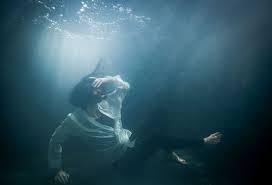
Chorus Why would you be lovin' Why would you be lovin' Why would you be lovin', hey And, hey, why would you be loved Mm, hey, why would you be loved
Hozier repeats this existential question over and over – love is not permanent, or a safe haven, it ends up hurting us, so why do we keep doing it? Why bother to give and receive love?
A few years later, On Unreal Unearth, Hozier resolves his own question with All Things End. Despair and bewilderment at the inevitable end of love has turned into “nihilistic optimism.”
Just knowing That everything will end Should not change our plans When we begin again
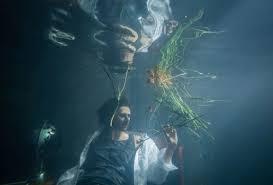
Verse 2 Now the world falls apart it starts with their actin' up I wouldn't say it, but I blame them The bleedin' hearts, the arts & that other stuff All the same motivations will melt away Like snowflakes on a tongue, baby So why, why, why
Besides the struggle with romantic love, the other major theme of Wasteland Baby is the ominous dread of apocalypse approaching, and the need to rise up politically against the dangers of the ruling class.
“Bleeding hearts” and “snowflakes” are doing double duty here, as terms for the tenderness and fragility of romantic love but also as derogatory terms for those with leftist or progressive politics.
“The word falls apart, it starts with their actin up, I wouldn’t say it but I blame them.”
I can see several possible interpretations for this opening line of verse 2, and who is the “they” acting up:
It feels like the world falls apart when your relationship ends, and you know the end is near once “actin up” or more conflicts/annoyances begin between the two.
Hozier “blames them,” all the older musicians whose work he listened to in youth, that love is not as “the arts” promised. Now in heartbreak again, he feels unprepared or misled on the true nature of love (and maybe realizes that his work too has contributed to the cultural myth of “love conquers all.”)
Hozier may feel frustrated that artists can describe the world so well, but all their efforts and talent are just "other stuff" and cannot directly change or fix anything.
“They” are the ruling class, and the world is literally falling apart on their watch. “I blame them” for keeping the people fixated on finding perfect romantic love, instead of noticing injustices that we are all harmed by, coming together in larger communities for mutual care or political action. (This final theory may sound a bit tinfoily, but Hozier has politics side by side with love throughout so many songs in Wasteland Baby, it seems hardly a stretch. Look what’s coming in verse 3!)

Bridge Why would you play it all on somethin' as hollow as trust? What if you gave it all, to find that it wasn't enough? What if under the gaze of all, you come short when the going gets rough?
Hozier reveals a worse fear than his lover not caring enough, what if his own best isn’t good enough to keep the relationship going? The “gaze of all” may be a nod to his fame, which came from writing romantic love songs, and is sustained by fans, some of whom openly imagine that he must be the perfect boyfriend.
Bad enough for anyone to come up short in love, but for “Hozier” to fail in this way might be an extra mind-fuck or identity crisis for him.
This tension seems to be resolved in “Too Sweet” where Hozier admits that his career & lifestyle might make him incompatible with some romantic partners, but he loves his life and is content to go their separate ways.
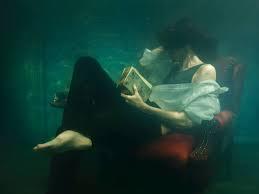
Verse 3 They look for somethin' to be done for those that are most in pain What about me and my achin'? The scales rehung, the breakin' of yoke and chain What about me and my breakin'? And if you ain't for all, how could you try at all, baby? So why, why, why
I can hear the back and forth internal dialogue between two attitudes in the same mind, and boy do I relate to this exact exchange.
Part of Hozier wants to protest for justice and freedom, in the spirit of Nina Cried Power, Jackboot Jump, Be, and even Moment’s Silence. While another part of him is in so much pain that he wants to be cared for and not take on the burden of others pain. Heartbreak and the world hurtling toward destruction both feel like impossible struggles to solve.
[Tangent for Enneagram folks – Hozier is likely a type 4, which is described as romantic, creative, gentle, prone to sadness, high emotional intelligence. Type 4s have a “growth direction” of Type 1, which is described as hard-working, disciplined, devoted to their ideals, and concerned about justice in society. I hear this verse as some push and pull between the Enneagram 1 part that wants to save the world, and the Enneagram 4 that wants to languish in sadness until they feel healed.]
Other Wasteland Baby songs that pair the ruin & hope of love with the ruin & hope of apocalypse include:
Be Be love in its disrepute (lover, be good to me) Scorches the hillside and salts every root (lover, be good to me) And watches the slowin' and starvin' of troops And, lover, be good to me (lover be good to me) Be there and just as you stand (lover, be good to me) Or be like the rose that you hold in your hand (lover, be good to me) That grow bold in a barren and desolate land And lover be good to me
Wasteland Baby And the day that we'll watch the death of the sun That the cloud & the cold and those jeans you have on Then you'll gaze unafraid as they sob from the city roofs Wasteland, baby I'm in love I'm in love with you
NFWMB Ain't it a gentle sound, the rollin' in the graves? … Ain't it warming you, the world gone up in flames? … Ain't you my baby? ain't you my babe?
24 notes
·
View notes
Note
How would you describe your writing style and who is your writing influence(s)?
I don't even know what my writing style is anymore and if I stopped to think about it, I'd have an existential crisis so I just write.
I think that if you're looking to improve, you shouldn't think in terms of what your writing style is but in terms of what you need in order to accomplish your goals for the story. Every scene if not every paragraph requires different things in order to function optimally. What I do is think about what I'm trying to accomplish and then decide from there what kinds of tools I need which basically means that your style can (and often should) change with every scene. An action scene would need snappier, shorter sentences and more focus on actions rather than thoughts and emotions in comparison to a quiet, heartfelt moment between the characters. So in that sense a writing style should be versatile enough to accommodate your story's needs rather than hinder you if you're focusing too much on it. It's also completely possible and okay to experiment with different styles for different stories.
That being said, some thoughts on my own style just came to me. It's definitely become less flowery than it used to be and I am relieved because I was using the turns of prose and metaphors to fill in the blanks left by the lacking substance. Now I just focus on saying what I have to say as clearly as possible. If I can insert a clever play on words in it or some cool imagery, that's great but it's not my priority. My thoughts tend to be abstract so I focus more on grounding them in easily perceived images because otherwise they're completely incomprehensible. Metaphors come in great use for that purpose but I'm using them way more sparingly than I used to, only when I really want to emphasize some idea or emotion. Otherwise, I just focus on the physical aspects of a scene and the senses, sometimes character thoughts though I try not to overdo it on that front. I noticed a while ago that I tend to get stuck in a character's head and go on and on about their inner world, which is a problem when the story is supposed to be about the interaction between two (or more) characters or between the character and their surroundings. I've put conscious effort into fixing that and I'd say it's working, at least partially. I'm pretty happy with the changes I've implemented in my writing style and process as a whole but there's always further things to iron out as you evolve as a writer.
I feel confident in saying that I do not have writing influences when it comes to a writing style. I've never tried to copy the way someone's prose looks and feels. I could stop to admire someone's style if it's caught my eye but I wouldn't try to emulate it. For example, I admire Douglas Adams' way of describing things but I could never do that myself and I wouldn't force myself to because it's just not the way in which my brain functions.
When I read a story, I'm mostly looking to borrow a technique from it rather than a style. That is to say, I am looking at the way the plot is structured or how the author builds suspense, which is way more a matter of observing the bigger puzzle pieces, the plot beats if you will, rather than the writing style itself. To be perfectly honest in the last 5+ years I've leaned way more into watching movies and TV shows rather than reading to lead to that result as you can learn about story construction from visual media but not about a writing style. It works for me because that's what I want to focus on.
When it comes to writing style, my philosophy is that I will figure it out myself. I am dreadfully independent when it comes to my creativity and refuse to accept any guidance. If I read any writing tips or examine a story with the idea of learning from it, I fully trust my own judgment and process. I follow the principle of trial and error - I test out everything that I think might work for me and if it doesn't, I immediately discard it. And that's about it!
6 notes
·
View notes
Text
2023 book recs! (to read and to skip)
inspired by @deanmarywinchester's incredible rec list and general reading reviews!
RECOMMEND:
The Murderbot Diaries by Martha Wells: I love you autistic androids. forever and ever. I'm pretending the adaptation is not happening bc I don’t think the screen can do it justice so I’m simply enjoying every single page of these books before there’s inevitable show Discourse. I love the plots and the dialogue and just like murderbot I too wish I could be left alone to watch my shows.
Something That May Shock and Discredit You by Daniel Lavery: this book has a couple excerpts on here that make the rounds and piqued my interest and holy shit. if you are trans and queer and probably autistic. read this book as fast as you can. I felt seen in every word and also. Absolutely read to filth.
The Traitor Baru Cormorant (the masquerade series) by Seth Dickinson: I think I finally started this series because of my bestie @ofbowsandbooks (as is the case with so many things) but who's to say. either way I read this towards the beginning of the year and have not stopped thinking about it since. if you read it. please listen to so much (for) stardust by fob. I cannot recommend the specific kind of damage it does to you while rotating baru and tain hu in your mind. just. tailored to me in so many ways (fantasy story about imperialism and masks and lying and the terrible power of math) so I do admit bias there.
Settlers by J Sakai: If you can only read a book or two about understanding why colonialism/capitalism is at the root of all evil...read this book. It's at the top of my general list of political nonfic recs (next to capitalism & disability by marta russell and border & rule by Harsha Walia). I like to describe it as a leftist pov of us history that pulls apart some of the liberal/white "optimism" of People's History of the US.
They Can’t Kill Us Until They Kill Us by Hanif Abdurraqib: I think this was also based on an excerpt I saw on here. I finally started getting into memoirs/essay collections this year and WOW. I mean, even if that genre isn't your thing, you should still read this book. It's just so so good, and utilizes unique topics (particularly music, I love his FOB essay) to explore both small personal moments and larger existential issues.
The Wretched of the Earth by Frantz Fanon: This is considered a staple of anticolonial movements & education for a reason. Definitely helpful for understanding the global decolonial revolutions of the 1960s.
Decarcerating Disability by Liat Ben-Moshe: An incredible study of abolition from a disability lens. Clear (if a bit repetitive at times) but overall an engaging read that definitely brings a much needed addition to larger abolition texts.
Chain-Gang All Stars by Nana Kwame Adjei-Brenyah: I read this one after seeing @deanmarywinchester's posts about it. I read it in two days and it knocked me so hard on my ass. Especially as someone who was obsessed with the hunger games in middle/high school. Just. Wow. holy shit. we knew this already but abolish prisons police etc etc and also we have GOT to be done with tiktok. and alexas. and just being okay with casually reposting/consuming videos and images of violence against people of color and and and -
Exile & Pride by Eli Clare: transmasc disabled PNW crew rise up!!!! the trauma of growing up as all these things in a small rural town!!! I have very rarely felt so deeply seen and understood as when I was reading this book. It's heavy emotionally & topically, so warnings there. I did struggle a bit with it but only because of how deeply some of his story reflects my own.
Innocence & Corruption by Aiyana Goodfellow: This book and its author demand a fundamental shift from how we as a society view and treat children. If you are planning on having kids, have kids in your life, are a teacher, etc etc, cannot emphasize enough how important this book is to remind us that kids are people now, and they deserve autonomy, respect, and support.
Honorable Mentions:
he who drowned the world by shelley parker-chan : this was moved down a category only because the book before this one (she who became the sun) is literally just setup for this sneaky gut punch. So as a duology, could be stronger. this book as a standalone? Wow. There's some banger lines and concepts and characters in there. (Wang baoxiang. Just. Oh boy). Definitely fascinating in convo with baru cormorant, and I think a reason it's lower for me as well is because the lens of hwdtw is much more of an internal power turmoil than a study of imperalism, which I'm biased towards interest-wise. I read this purely because of @ash-and-starlight's incredible art, so please go check that out if you read the book - It is absolutely worth the read for their art.
the Black Jacobins by C L R James: I'm a french revolution bitch. it was a special interest of mine as a kid and got me invested in history. that said, we gotta talk about france's fuckery. which is to say, slavery/genocide/colonialism etc etc. This book is somewhat tricky to read at points, especially in keeping track of who's who, but a really incredible explanation of the beginning of Haiti's fight for independence. If you enjoy French or Caribbean history, anticolonial revolutions, and some of the nitty-gritty details of history textbooks, this is for you.
life under the jolly roger by Gabriel Kuhn: who here has seen black sails. (thee gay pirate show. Original edition.) strikes a good balance between an understanding of what pirates have/can/could represent, and absolutely clarity about their actual violence, legacy, and politics. Informative without being drawn in by the romanticism or dismissing its power completely.
the essential June Jordan: Politically relevant and also just lyrically beautiful poetry.
hell followed with us by Andrew Joseph White: trans horror fans w/ Christianity beef, this is for you. I am NOT a horror fan, but it was so well done and resonant with me that I stomached the gore for it and do absolutely recommend. if that’s your thing
DO NOT RECOMMEND:
the invisible life of addie larue by ve schwab: I love VE and am a bit of an apologist for her prose over plot bc her worldbuilding is always so cinematic to me, but this was such a frustrating waste of a brilliant concept. It was just...boring? Neither Addie nor Henry are particularly interesting (Henry's relatable, but again, not engaging as a character) and for someone who's been alive for a long time, I expected more unique flashbacks and worldbuilding. I expected the ten thousand doors of january, but this was not that, although I think at its soul it wanted to be.
the lies of locke lamora by scott lynch - Been meaning to read this forever since it was recommended a lot on here if you liked six of crows. I would say a similar setup (dickension fantasy) but that's about it. Characters aren't that likeable or clever, the action is slow, and I take issue with the ending.
unwieldy creatures by addie tsai - I so badly wanted this book to be good. It was not.
a day of fallen night by samantha shannon - It was fine, it's just such a long book I think time is better spent elsewhere, ya know?
provenance - second ann leckie book that i've finished unimpressed. despite murderbot being top of my list, this similar vibe of sci-fi did not strike me as one with such a unique clear voice. It just felt like a more inclusive version of many average space books.
5 notes
·
View notes
Text
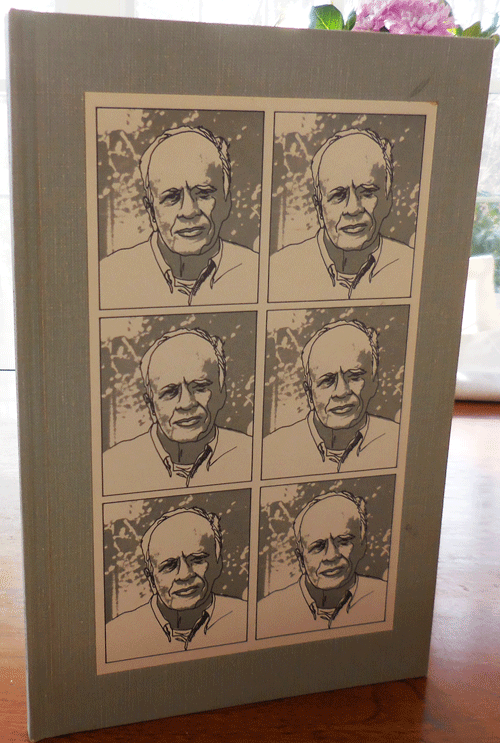
“Let me specify briefly what appears to be the nature of the change in the community in which we find ourselves and the correspondingly changed posture of the novelist.
To state the matter as plainly as possible, I would echo a writer like Guardini who says simply that the modern world has ended, the world, that is, of the past two or three hundred years, which we think of as having been informed by the optimism of the scientific revolution, rational humanism, and that Western cultural entity which until this century it has been more or less accurate to describe as Christendom. I am not telling you anything you don't already know when I say that the optimism of this age began to crumble with the onset of the catastrophies of the twentieth century. If one had to set a date of the beginning of the end of the modern world, 1914 would be as good as any, because it was then that Western man, the beneficiary of precisely this scientific revolution and Christian ethic, began with great skill and energy to destroy himself.
Christendom began to crumble, perhaps most noticeably under the onslaught of a Christian, Soren Kierkegaard, in the last century. Again I am not telling you anything new when I suggest that the Christian notion of man as a wayfarer in search of his salvation no longer informs Western culture. In its place, what most of us seem to be seeking are such familiar goals as maturity, creativity, autonomy, rewarding interpersonal relations, and so forth.
To speak of the decay of Christendom is to say nothing of the ultimate truth of Christianity, but only to call attention to a cultural phenomenon and the symbols with which it was conveyed. What concerns us here is that, from the perspective of the novelist, literary attempts to revive traditional expressions of Christendom are seldom undertaken anymore. Even when they were, it was often with the sense of a nostalgic revival of a way of life, or else undertaken with the skill of a great novelist in portraying a belief which he did not necessarily subscribe to. I am thinking in particular of the Southern Agrarians and of Faulkner's Dilsey. But most contemporary novelists have moved on into a world of rootless and isolated consciousnesses for whom not even the memory and the nostalgia exist. As Lewis Simpson put it: "The covenant with memory and history has been abrogated in favor of the existential self."
But before speaking of the kind of novel which becomes possible in such an age, the "post-modern" or "post-Christian" as it is often called, I should like briefly to characterize the age itself, or one or two traits of it, from the point of view of the novelist. For the latter is, like his predecessors, seeking some remnant of a common ground where he can gain sufficient footing so that he can see and tell and where he hopes there will be others, other writers, other readers, who share, if not a consensus, a common belief of myth, at least a sense of predicament shared in common.
Toward this end, it seems fair to describe the times not merely in conventional terms as a world which has been transformed by technology both for good and evil, the evil being, of course, the very real ugliness of much of the transformation and the very real depersonalization of many people living in such a world.
What is not so self-evident yet of far greater import to the novelist is the more subtle yet more radical transformation of the very consciousness of Western man in an entirely unexpected way by the scientific and technological worldview. I am not talking about the mechanization and homogenization and dehumanization one hears about so often—though I would not quarrel with these descriptions. We are all familiar with an entire literature about the ennui of life in suburbia and the split-level nightmare. Yet this literature itself is generally even more boring than the life it portrays. Aside from the worth or lack of it in such novels, I cannot escape the suspicion of a degree of bad faith both in the novelist and in his characters, that, in short, for all their complaints, neither of them would dream of changing places with the nineteenth-century housewife or the low-paid nineteenth-century novelist.
No, the real pathology lies elsewhere, not in the station wagon or the all-electric kitchen, which are, after all, very good things to have-but rather in the quality of the consciousness of the novelist and his characters. I can only characterize this consciousness by such terms as impoverishment and deprivation and by the paradoxical language of the so-called existentialists, terms like loss of community, loss of meaning, inauthenticity, and so on—paradoxical because such deprivations occur in the face of strenuous efforts toward better consumership, more communication, a multiplication of communities, finding "more meaningful relationships," "creativity," and so on.
The deprivation I speak of is both more radical and more difficult to define. But I'll try.
Every age, we know, is informed by a particular belief or myth or worldview shared in common by the denizens of the age. Thirteenth-century Europe was certainly informed by Catholic Christianity, seventeenth-century New England by Puritan Christianity, present-day Thailand by Mahayana Buddhism. But we miss the point if we say that the Western world and the life of Western man has simply been transformed by scientific technology. This is true enough, but what has also happened is that the consciousness of Western man, the layman in particular, has been transformed by a curious misapprehension of the scientific method. One is tempted to use the theological term "idolatry." This misapprehension, which is not the fault of science, but rather the inevitable consequence of the victory of the scientific worldview accompanied as it is by all the dazzling credentials of scientific progress. It, the misapprehension, takes the form, I believe, of a radical and paradoxical loss of sovereignty by the layman and of a radical impoverishment of human relations-paradoxical, I say, because it occurs in the very face of his technological mastery of the world and his richness as a consumer of the world's goods.
Like Nikolai Stepanovitch in "A Dreary Story," the moment of our victory in science seems to be attended by a strange sense of loss and impoverishment. In certain areas, such a surrender of sovereignty is not disabling. When something goes wrong in our technological environment, if something needs fixing, whether it is one's car or one's intestinal tract, we have reason to believe that "they" can fix it, "they" being the appropriate specialist. Our expectations are not unreasonable. Very few of us have the time or inclination to master carburetor repair or the physiology of the GI tract. But what happens when one feels in the deepest sense possible that something has gone wrong with one's very self? When one experiences the common complaint of the age, the loss of meaning, purposelessness, loss of identity, of values, and so on? Here again, I am the last person to suggest that psychiatrists do not have an important role; indeed, an increasingly important role. The problem I am speaking of is only too well known to psychiatrists. What I do suggest is that a radical loss of sovereignty has occurred when a person comes to believe that his very self is also the appropriate domain of "them"; that is, the appropriate experts of the self. A typical case of such a surrender of sovereignty is the patient who is delighted when he can present his psychiatrist or analyst with a symptom or dream which fits the prevailing theory—or when he performs well in an encounter group. The patient is, in effect, saying, "I may be sick but how happy I am when I can present my doctor with a sickness or a symptom or a dream which is recognized as a classical example of such-and-such a neurosis: I am an authentic neurotic!"
But what has all this to do with the state of the novel? Strangely enough, it is this very misapprehension of the scientific method, its elevation to an all-encompassing world view, which breaks new ground for the novelist and indeed opens the possibility of a new and critical role for the novelist of the future.
Let me oversimplify this misapprehension and state it as briefly as possible. What I am about to say is no secret to the scientist, is in fact a commonplace, but it is not generally known by laymen. The secret is simply this: the scientist, in practicing the scientific method, cannot utter a single word about an individual thing or creature insofar as it is an individual but only insofar as it resembles other individuals. This limitation holds true whether the individual is a molecule of NaCl or an amoeba or a human being. There is nothing new or startling about this and nothing a scientist would disagree with. We all remember taking science courses where one was confronted with a sample of sodium chloride or a specimen of a dogfish to dissect. Such studies reveal the properties shared by all sodium chloride and by all dogfish. We have no particular interest in this particular pinch of salt or this particular dogfish.
But perhaps we are a bit startled when we are told that this same limitation applies to psychiatry. In the words of Harry Stack Sullivan, perhaps the greatest American psychiatrist: To the degree that I am a psychiatrist, to this same degree I am not interested in you as an individual but only in you and your symptoms insofar as they resemble other individuals and other symptoms.
Again, what has this to do with the novel? Perhaps I can state the connection best by describing my own discovery. As a person educated in science, as an admirer of the elegance and truth of the scientific method, and at the same time as a medical student undergoing psychoanalysis with the intention of going into psychiatry, it dawned on me that no science or scientist, not even Freud, could address a single word to me as an individual but only as an example of such-and-such a Southern type or neurotic type or whatever. All very well and good, you say, but so what? But you see, there is a Catch-22 here. The catch is that each of us is, always and inescapably, an individual. Unlike a dogfish, we are stuck with ourselves and have somehow to live out the rest of the day being more or less ourselves. And to the degree that we allow ourselves to perceive ourselves as a type of, example of, instance of, such-and-such a class of Homo sapiens—even the most creative Homo sapiens imaginable—to this same degree do we come short of being ourselves.
As to the novel, I can only speak in terms of the discovery which led me to take up novel-writing, a vocation for which I was otherwise singularly unqualified. For, of course, a novelist should be well educated in the humanities, in literature, and if he is a Southern novelist, I am told that he is supposed to be saturated by the Southern tradition of folklore, yarns, storytelling, family histories, and such. If you want to be another Faulkner, you have to spend a good deal of time hunkered down on courthouse lawns listening to old-timers talk about the way things were. I qualify under none of these canons, having been born and raised in Birmingham, Alabama, in a new house on a new golf course. The only stories I ever heard were jokes in the locker room.
What did at last dawn on me as a medical student and intern, a practitioner, I thought, of the scientific method, was that there was a huge gap in the scientific view of the world. This sector of the world about which science could not utter a single word was nothing less than this: what it is like to be an individual living in the United States in the twentieth century.
This discovery had all the force of a revelation, at least for me, brought up, as perhaps most of us are, in the tradition of John Dewey and William James, the proposition of American pragmatism that science deals with truth and art deals with diversion, play, entertainment; anyhow, some form of emotional gratification.
But what are we to make of a man who is committed in the most radical sense to the proposition that truth is attainable by science and that emotional gratification is attainable by interacting with one's environment and at the highest level by the enjoyment of art? It seems that everything is settled for him. But something is wrong. He has settled everything except what it is to live as an individual. He still has to get through an ordinary Wednesday afternoon. Such a man is something like the young man Kierkegaard described who was given the task of keeping busy all day and finished the task at noon. What does this man do with the rest of the day? the rest of his life?
But my question and my discovery was this: if there is such a gap in the scientific view of the world, e.g., what it is to be an individual living in the United States in 1985, and if the scientist cannot address himself to this reality, who can? My discovery, of course, was that the novelist can, and most particularly the novelist. Oddly enough, it was the reading of two nineteenth-century writers, Kierkegaard and Dostoevsky, who convinced me that only the writer, the existentialist philosopher, or the novelist can explore this gap with all the passion and seriousness and expectation of discovery of, say, an Einstein who had discovered that Newtonian physics no longer works.” - Walker Percy, ‘Diagnosing the Modern Malaise’ (1985)
1 note
·
View note
Text
Running up that hill
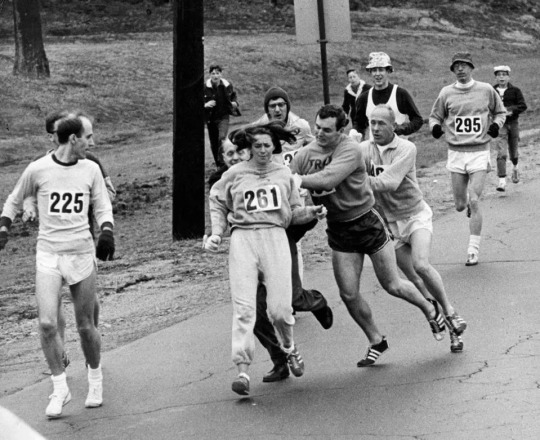
Three times a week, I go running. Not particularly long or particularly fast, I don’t set goals for improvement or anything of that kind - I just run. However, spending a considerably amount of your time running necessarily leads to thinking about running as well. I also spend a lot of time reading, and eventually, I thought I would like to read about running. However, I could only find books written by men on the subject. “Why are there no books about women running?” I complained to my boyfriend. A couple of weeks later, Amalie Langballe asked the same question in Weekendavisen. Training for a Marathon, she similar to me had been unable to find satisfactory literary accounts of women running. Why does the gender of the author matter? Langballe points to that 1) these cismen know nothing of running with period pains or trying to find a fitting sports bra and 2) that these accounts often get very man-ish, lofty, and pretentious. She names the running classic What I talk about when I talk about running by Murakami as an example.
Despite this pretentiousness, I enjoyed reading Murakami’s What I talk about when I talk about running, but then I came to this section where he describes being passed by female runners on his jog:
Fatigue has built up after all this training, and I can’t seem to run very fast. As I’m leisurely jogging along the Charles River, girls who look to be new Harvard freshmen keep on passing me. Most of these girls are small, slim, have on maroon Harvard-logo outfits, blond hair in a ponytail, and brand-new iPods, and they run like the wind. You can definitely feel a sort of aggressive challenge emanating from them. They seem to be used to passing people, and probably not used to being passed. They all look so bright, so healthy, attractive, and serious, brimming with selfconfidence. With their long strides and strong, sharp kicks, it’s easy to see that they’re typical mid-distance runners, unsuited for long-distance running. They’re more mentally cut out for brief runs at high speed.
When Murakami himself is running, it is connected to his creation of art, to existential questions, almost to the human condition. When he sees women running though, he silently mocks them for their competitiveness, while at the same time admiring how they look. That he himself participates in multiple races a year where he cares a great deal about his performance, is apparently an entirely different case.
Whenever women runners do appear in literature, them running is always a sign of something being wrong with them. In Samlade verk by Lydia Sandgren, the main character Martin’s wife has purposefully disappeared without a trace. Prior to the disappearance, she was a runner, and in the story, these two facts appear connected. She runs long-distance because she is obviously running from something. As such, running appears as a compulsory, almost pathological, activity. It is not only in literature that running women are viewed with suspicion. At a party, I mentioned this to some friends. Sara mentioned the famous photo of Kathrine Switzer who in 1967 joined the Boston Marathon as the first woman runner. To avoid drawing attention to herself, she wore a hoodie. When it fell off, she was attacked by fellow male runners who wanted to stop her participation. Simon added an anecdote from the book Born to run about a woman in a small town in USA who starts running long distances. Everyone in the town thinks there is something wrong with her; in reality, she just likes running.
When women exercise isn’t view as proof of something being wrong with them, it is most often seen as a sign of her attempt to conform to beauty standards. In her essay Always be optimizing, Jia Tolentino analyzes the history of women’s self-optimizing, arguing that the recent decade’s proliferation of fitness culture should be understood as a continuation of the age-old pressure for women to mold their bodies in a certain way. We might have re-termed it to be about being ‘strong’ or ‘healthy’, but this is essentially what it is about. While I think there is a lot of truth in Tolentino’s diagnosis, which also includes a critique of the billion-dollar fitness industry and the way this optimizes our participation in capitalism, I think she is a tad pessimistic or determinist about women’s relationship to sports. Can’t we have a genuine interest in the sports discipline we partake in or truly enjoy the rush following physical exhaustion?
Of course, running is not only about the activity in itself (is there any activity there is?). But how come, for women, it must necessarily be connected to mental illness or body issues while for men, it is connected to art and existential questions? But the bigger question is, why are there so few women who write about running when evidently, there are so many women who run? One answer could be that women have less time than men due to our disproportionate participation in reproductive labor. Journalist Anders Legarth wrote the book Jeg løber [I run] based on a column series he wrote in the newspaper Politiken about starting to go long-distance running as a way to cope with the tragic death of his six-year-old daughter. I read the column sporadically and while I was sympathetic to it, I couldn’t help but think about what his wife was doing all those hours he was running – I guess she was probably taking care of their other two children. Perhaps women don’t feel the same need to write about every single hobby they pick up as something life changing. Or maybe it is just me who has not found the books yet. I will continue searching.
References:
Langballe, Amalie. 2023. ‘Afdæmpede besyngere’. Weekendavisen.
Legarth, Anders. 2018. Jeg løber. Politikens Forlag.
Murakami, Haruki. 2009. What I talk about when I talk about running. Vintage.
Sandgren, Lydia. 2020. Samlade verk. Albert Bonniers förlag.
Tolentino, Jia. 2019. ‘Always be optimizing.’ In Trick Mirror: Reflections on self-delusion. Random House.
1 note
·
View note
Text
January 7th 2023
An Acrostic for Windfall
W----------Win
I---------------In
N--------Nice
D-------Dimension
F-------Fulfilling
A-------As
L------Life’s
L--------Lucky Grace
When reason and passion unite art begins. I hope that the art of muse remains with me throughout 2023. I enjoy the way the words become thoughts and things. I live life as a poem of victory. I am a beatific soul of beauty. Money grows on tree and yes money can buy happiness. I want to transcend all the novelists, poets and philosophers that I have read. My writing describing the objects of nature is a still life of painting. What is truth? Truth is the lived presence of meaning. Thoughts become the sculpture of things. I am fond of Avant-gardism. Intimacy is the heart of meaning. Time slows down and becomes a subjective truth in streams of consciousness. A dove is a metaphor of peace. The amorous self is a hyperbole of exaggeration. I wish that the aches and pains of life will turn into a joy of living. What is beauty? Beauty is the ornament of experiences. Has literature reached exhaustion and death? No it hasn’t and literature is always being celebrated as the art of meaning. Literature is the reincarnation of beauty. What happens when we go beyond the signifier (visual sensible world of words) and signified (intelligent ideal world of words)? We arrive at a state of experience as possession, incarnation, invocation, affirmation, catharsis, victory, ecstasy, eroticism, success and affluence. Language beyond the sign is the celebration of meaning. Here I am rewriting the existential philosophies of Sartre and Camus. I read Kant’s philosophy of transcendental idealism. In it he speaks of a difference the world of the senses and the world of experience. Orgasm is the bliss of experience. Sex is the highest form of art, a beatific surreal experience. We need to have the heart of passion and the mind of reason. Are we not manifestation of desires? I desire the life I want to live. Life is organized music. Before loving your neighbor, love yourself. Fulfillment is the endurance of expectation. Life is a pleasant anecdote. Eroticism is mutually shared. Affirm the dictum of Prospero Prometheus as the celebration of life. Pot is a beatific experience of the mind and body. Cure the dope of pessimism with the pill of optimism. After my death the only legacy that I leave is my writing. Binary fusion is a postmodern term that is coined by me. In it there occurs a text that does not privilege or marginalize anyone. Jazz is music of binary fusion which has won world acclaim as a contribution of black culture and being used thorough the entire world. How much I long for physical intimacy. My wife is so uncooperative and my significant other is miles apart from me. I want to flower my body with the intimacy of poetry. There is a colleague teacher who has lost her husband recently. I am thinking of wooing her but I am too shy to make the first move. I am no longer interested in masturbation as it bores me to death. I live a life that is poetic and passionate. Money for me is a greedy luxury. I am addicted to sex, booze and pot.
0 notes
Text
Jon Bois writes about sports things that I have next to zero knowledge of and it will be funny. he writes a silly joke and I laugh,, and then,,,
and then he says things like "it's so beautifully, obnoxiously fake” and “a moment like this has no business in our world” and “maybe I am in heaven, and heaven is scary” and “the world was all fucked up. I remember feeling so alone. like I was the only one fighting it” and “we were all in it together, though. every stranger you ever met, they were fighting the very same fight you were” and “we all had each other, no matter how often we forgot it. all of us, we always had each other” and “we were always at the end” and “it's a free play, buddy. clock's all zeroes” and “it's after the end of the world” and,,,,
yeah. I don’t even have the braincells to articulate what I’m feeling but. yeah.
#.txt#wyv gets emotional over 17776 and that one baseball documentary again#my head's a mess but like. jon's writing is one of the few things keeping me going at the moment#existential optimism is the only way i can describe it#anyway. it's the middle of the night can you tell
1 note
·
View note
Text
I’m the fucking lizard king- (1)
Summary: The idea that if you repeatedly bash your head into a brick wall, eventually the brick wall will love you back.
Pairing: OC!AFAB/NB!ChaoticDumbass (but described vague enough to be reader)xTFATWS!Bucky
Word Count: 762
Warnings: for this chapter? just bad language and existentialism.
A/N: welcome to the shit show. void is a character i’m working in a novel for.
[if you want you can pretend there’s a cover image here, but i’m too dumb for photoshop]
The notebook that Dr. Raynor took notes with, more to prove a point than to write anything, in her sessions with Bucky laid across her thigh as her pen scratched notes about how childish he was being. Bucky kept refusing to answer questions, or flat out lied to her, and her battlefield tried patience was wearing eerily thin.
“Jesus Christ, this again? I thought we were past the passive aggression?”
“If you don’t talk, or if you lie,” she added, knowing that he would try to worm his way around her rules, “then I write. That’s how it’s been from the beginning, James.”
“Alright, alright. Put the pen down,” he surrendered. Bucky let out a chest-rattling sigh, the kind that made your ribs feel empty.
“So again, I’ll ask. How are the missions with Sam and V going?” Christina placed her pen in it’s holder on the notebook and set it to the side, folding her hands in her lap and training her gaze on Bucky.
“Good. They’re going really well. Sam is as annoying as usual, too much optimism for someone who’s been arrested by the federal government and spent two years on the run,” he shared, his eyes fixed on where he was toying with the seam on his gloves. Sharing his feelings and eye contact wasn’t something that he’d worked up to yet.
“And V?”
Void, or V for short, was a new team member. Someone that they’d found in Madripoor with connections to information on the soldier serum and the power broker and incredibly too much sugar in their system at all times. Team mate might not be the right phrasing, either, because it wasn’t like they’d ever gotten an invitation to the team officially. Void, more or less, just thought the two of them were entertaining and decided to tag along. The usefulness they provided on missions was more a side effect than an intended outcome.
Bucky rolled his eyes, a familiar flush creeping up the back of his neck as a whole new wave of irritation crashed over him.
“Void is -- fuck, I don’t know.”
“You don’t know how you feel about them as a teammate?”
“I don’t know how I feel about them as anything to me, doc.”
“Sounds like your thoughts run deeper than you’re willing to say.”
________________________________________________________________
Bucky’s phone had buzzed a total of eight times while he was in that appointment. Once he was on the street and headed back to his own block, he pulled it out of his pocket and went over the barrage of text messages from Void.
V: do you think there are aliens who think they’re the only sentient beings in the universe?
V: what if the earth is flat but it’s like a coin and edges are rounded so you never like fall off the edge or whatever and the sail from one side to another never looks like a disc?
V: bucky these are important questions please respond :(
V: i’m going to start sending you memes you wont understand unless you reply to me in the next five minutes. >:|
V: two more minutes boinky, i swear to britney i’ll do it >:(
V: i’m literally an angel i don’t understand why you hate me so much :’(
V: [image attached]
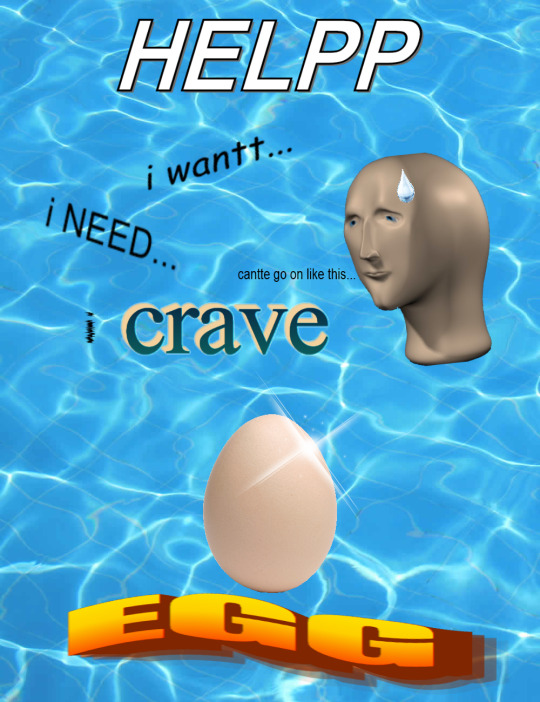
V: [image attached]

Bucky gripped his phone willing his patience to reappear before he snapped it in half. When he looked back down at the screen he noticed that the bubble with the three dots had appeared, signaling that Void was typing again.
Bucky: if you don’t shut the fuck up i am going to choke you to death
V: FUCKO!!!
V: finally you replied. i thought you left out of the back door and i wouldn’t get to see how irritated you were.
Bucky’s eyebrows knitted together, looking up and down the street to find where Void was stalking him from. He couldn’t see them, couldn’t tell where they were hiding, but he felt eyes on him like lasers.
V: there’s no point in looking for me, you know i’m way better at hiding than you
Bucky: where the fuck are you, i’m coming to kick your ass
V: Dr. Raynor would be very dissapointed to hear you say that
Bucky: excuse me? you know about my therapy sessions?
V: google is my friend, dumbass.
Bucky: you better pray i don’t find you, v
V: but jaaaaaames you never hang out with me. i have to go all yandere just to even pretend we’re friends
Bucky: we’re not friends
V:
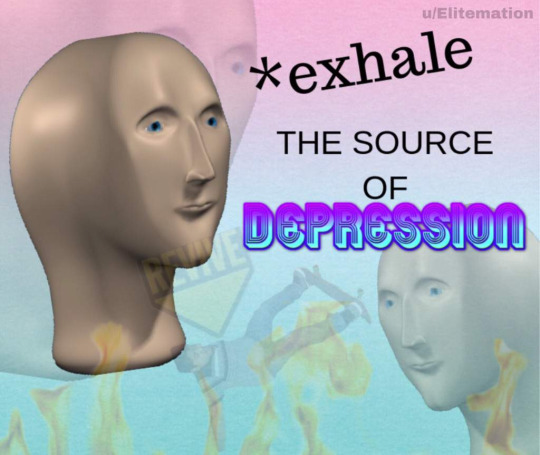
Bucky: found you. two buildings over. south wall. your ass is grass.
V: AND I OOP
Before Bucky could break out in a dead sprint, his arm itching to get Void in a headlock, his phone vibrated again.
Sam: Why was I just emailed V’s last will and testament?
______________________________________________________________
A/N: I’m not smart enough to keep up with tag lists. :)
#bucky barnes fanfiction#bucky barnes x y/n#james buchanan barnes#james bucky barnes#marvel fanfiction#TFAWTS#the falcon and the winter soldier
4 notes
·
View notes
Link
Describing Dashiell Hammett’s noir detective character The Continental Op, literary critic Steven Marcus inadvertently captures the reactionary. Both detective and reactionary emerge from profoundly disordered societies. Their gut tells them something is amiss, that their circumstances are fundamentally unsatisfying. Each finds himself waking up to a world of falsehoods, where natural inclinations are everywhere subverted, where human flourishing is derailed or destroyed, and where truth is buried under mounds of error. With little to nothing left to ‘conserve’, the reactionary becomes a deconstructionist, a detective, stripping away contemporary liberalism’s false legitimations.
There are several branches of reactionary thought, but most if not all share at the core an antipathy for the money-power, a sacral understanding of culture, affinity for hierarchy, and some degree of hero-worship. These threads persist regardless of any particular riffs or permutations. The reactionary, through churchism, nationalism, vitalism, traditionalism, or some combination thereof, struggles against liberal nihilism, the deracination of romantic visions and immaterial goods. In short, reaction rejects the myth of Progress.
…
Modern decadence rarely takes the form of lavish balls or orgiastic retreats. Instead, it is characterized by exhaustion, the desocialization of pleasure and thrill, anhedonia. Late cartographer of capitalism Mark Fisher describes the latter vividly as “the soft narcosis, the simstim eternity, the comfort food oblivion of Playstation, all-night TV and marijuana.” All forms of fulfillment eternally forestalled by gluttony, onanism, and the general inability to disconnect from our ever-present digital dopamine drip. Contemporary reaction, then, often originates as a backlash against passivity, consumerism, sterility, physical weakness, and all the other rotten fruits of disenchantment.
…
While it is no doubt true that many past eras surpassed our own in virtue, beauty, and spirituality, it is impossible to return to the same set of social, economic, and technological conditions that shaped the past. A Bushism summarizes the issue well: “I think we can agree, the past is over.�� The challenge, then, is to fashion a society out of postmodern clay, in which natural virtues again flourish. The reactionary mind must attune itself to the particular ailments, conditions, and advantages of postmodernity.
…
Until very recently, this was an apt description of the Western world. But as liberalism works itself pure and intersectionality marches through the institutions, it also reintroduces the West to metanarrative. From the Enlightenment’s murder of myth, through to the Enlightenment’s death, we have arrived again at an era of myth. As the United States continues its transformation into an ideological state premised on gender gnosticism, anti-whiteness, and anti-nationalism, liberalism’s hyper-moralism becomes clearer.
Today, the West is returning to the political as such, to a state of polemos, the social warfare that punishes, purges, and partitions. Yet the regime’s tendency toward anarcho-tyranny, as well as postmodernity’s general liquidity and chaos, lends extra potency to reaction’s promises of order, beauty, and the sacrosanct. These developments are a great boon to reaction. Politicization is a preferable outcome for the reactionary, and one step closer to the outright conflict necessary to effect social rejuvenation.
…
With normalcy demonized at every turn, the West finds itself in another Prohibition era. The person who honors his ancestors, obeys God, and admires traditional mores participates in “collaborative illegality.” Societies of illegality, where day-to-day life becomes a radical state of affairs, are fertile ground for reaction. Confrontation is everywhere preferable to obfuscation. If, as detectives, reactionaries are emergent byproducts of decline, then we should expect them to proliferate as decline accelerates and the spirit of polemos enlarges.
…
The scuttled America First Caucus recently proclaimed America as “a nation with a border, and a culture, strengthened by a common respect for uniquely Anglo-Saxon political traditions,” and decried mass migrations disruption and disintegration. The media backlash to the term ‘Ango-Saxon’ was both predictable and educational. America, as it was perceived by the Founders and most subsequent generations, no longer exists.
The Confederates are clarifying here. If we considered the United States as an Anglo-Saxon civilization, which incorporated other ethnic groups into this civilizational fabric, the Civil War was a tragic conflict between kin. If being American means identifying with a vacuous, chimeric liberalism, then the Civil War was an existential battle between the supposedly chthonic horror of racism and the ever-perfected march of reason. This is exactly how the ruling elite perceives the United States: a polity on an ideological mission to liberate the world, whatever form that liberation may take in each succeeding generation. America’s refusal or inability to recover a moderate and reasonable ethnos is nothing less than suicidal. If immigration continues and there is no American identity aside from vapid cosmopolitanism, the money-power will continue its disintegration and rulership over the United States.
A bleak portrait, perhaps. But so is a crime only halfway solved. As a detective continues his investigation, to be called on amid a crumbling society of illegality, so does the reactionary continue forward. He is often the fortunate benefactor of Providence, that sublime knife which eternally slips loose Gordian knots. The Gracchi brothers’ assassinations by the optimates and their mob paved the way for Caesar; Jacobin excess unwittingly opened Fontainebleau’s doors to Napoleon, and Europe’s midcentury dirge kept Iberia under reactionary rule until the third Christian millennium. If Buchanan began transforming American conservatives into reactionaries, and Trump made reaction politically viable — if even for a moment — we can reasonably hope reaction will maintain its historical relationship with decline, and be nourished by decay.
…
With that and all the above in mind, we may sketch a vision for an Occident shaped by reaction. As with reaction generally, it will be a romantic vision. After liberalism’s society of illegality inevitably buckles under its own weight, the regime’s simultaneous reaction emerges triumphant. The inevitable degeneration of republics into oligarchies reaches its climax: the ‘one and the many’, king and peasantry, president and people, triumph over ‘the few’, optimates, oligarchs, regime Brahmans, and the like. Porous borders are shut, capital is disciplined and reordered to serve national rather than global, financial interests. Liberalism’s atomization buffet is shut down for good, the policies and laws that annihilated the family are overturned, gender is reembodied, and voluntary infertility is a dwindling artifact, a bygone object of derision. The past, which Fisher calls “forever lost and forever insistent,” is insisted upon, and revitalized through new modes of government, old sacraments, and the erection of monuments that honor the past and promise the future.
If this sounds fanciful, it’s because it is. No clarion call to ‘build’ can make the path any straighter or the course any clearer. What reactionaries may take solace in, however, is the organic nature of human societies, the predictable decline and rejuvenation of civilization as superorganism, history’s countless overthrows and about-faces. When it happens, it will seem as if it couldn’t have happened any other way. Georges Sorel speaks to this through Vincent Garton’s translation, prophesying: “We would very much need a Mongol conquest to effect the rebirth of great art, today enslaved to the barbarian tastes of the plutocracy.” Accordingly, only terminal decline produces successful reaction.
A reactionary West will emerge from the same organic historical process that has carried reaction to power again and again: the Hamiltonian battle between, on one side, ‘the one and the many’, and on the other, ‘the few’, from revitalized conceptions of ethnos, thymos, and telos. In the vain hope of identifying and reestablishing a timeless and just social order, the Western Man today must dig through refuse and rubble and investigate the gleaming scraps and trinkets he finds underneath. He must do as the noir detective does — live within and struggle against the society of illegality, case by case, until there are no more crimes to be solved, no deconstruction and reconstruction to be undertaken. He must exist as something ‘natural’, beyond reason and beneath society, so that when the time comes, when Providence cuts the Gordian knot, he will be ready to lend his labor to monuments that honor the West’s past and promise its future.
4 notes
·
View notes
Text
My Love For The Eighth Doctor Books
Disclaimer: This essay is awfully long, the structure is terrible, and it probably shouldn’t have been over 4000 words, but hopefully, you’ll enjoy my insight of the Eighth Doctor Books.
Introduction
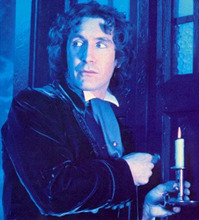
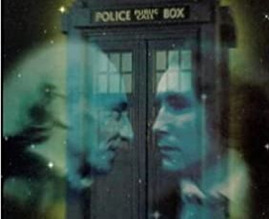
Trying to create a character around a brand new Doctor is tricky and Paul McGann’s incarnation is perhaps the biggest example for this. After 1996, he never had a TV appearance to fully flesh out the Eighth Doctor and remember: Big Finish didn’t use the Eighth Doctor until 2001. So writers in 1997 had a difficult task, especially when the Virgin Books lost the rights to the DW IP and were back in the BBC’s rights. Some Virgin New Adventure writers like Kate Orman, Justin Richards, Paul Leonard had come to write for the EDA’s, but new talent had to come in as well. They all had to intricately look at like, what, 40 minutes of McGann’s screentime in the TV Movie, half of which was the Doctor trying to figure himself out from amnesia and the other half is him being thrust into the plot without any way to truly develop his character. So… yeah, I actually can’t blame the writers finding their feet, at least with the VNA’s developing the 7th Doctor, he had 12 stories. Also, trying to pick up from the massive popularity of the VNA’s, and oh my God, I feel so bad for the writers. But, there could be a slither of a chance, maybe the magic they could have brought from the VNA’s can be replicated again. So, did it work? Hell yeah, it did!... just not under the guise of Uncle Terry Dicks. Just…screw everything about The Eight Doctors, it’s the worst possible starting point. But after that blip, yeah, it’s my favourite era of the Doctor Who IP, bar none.
Exciting Ideas
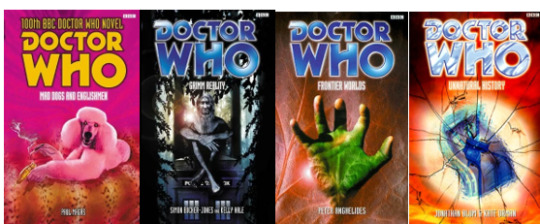
I’ll start off listing the sci-fi elements first before getting into character work. Much like the VNA’s, perhaps even more so, the EDA’s are not afraid to bring bold, extravagant ideas that TV Who could never do, perhaps not even what Big Finish could do, because of the novel format that allows descriptions and characters to fully grow. The Books are able to describe how a planet looks, feels, sounds, even down to taste so effortlessly, and a part of it is how unique, so bizarre, so beautiful these planets are, so… intimate. Could Doctor Who ever do planets like Albert (a planet entirely made out of Grimm’s fairy tales), Hitchemus (a colony world thriving on music and inhabited by intelligent tigers), The Crooked World (much like the Land of Fiction, except all the inhabitants and settings are cartoon-based). Not even Big Finish pulls off such weird and surreal settings and that’s because of the prose style allowing time and dedication to flesh out the multiple planets, without feeling clunky in its description and dialogue, which could plague early BF stories at times. But it’s not just the variety in the settings that make it great, there are also fascinating new ways to tell these stories with different formats. Narratives can be told in a Pulp Fiction-esque, out of order style (The Last Resort), told backwards (Festival of Death), books where the Doctor is barely in it but his presence is booming (Sleep of Reason), books told from the first person POV (The Turing Test, Frontier Worlds, Banquo Legacy), a narrative told from a non-fiction documentary perspective (Adventuress of Henrietta Street), a narrative told in a essay format (History 101), and that’s only a handful of the formats. There’s multiple pastiches and parodies; Trading Futures does Doctor Who crossed with James Bond harder than the Pertwee era, The Tomorrow Windows replicates Douglas Adams’ style down to a T, The Crooked World is basically Doctor Who crossed with Hanna Barbara Cartoons and many more. God, everything is so unique and wacky in this book range.
The Tone and Theming
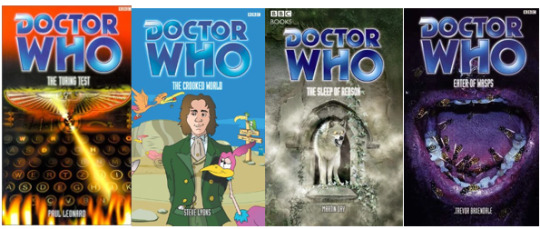
As for the Books’ tone, it’s certainly interesting. In the VNA’s, because a lot of new talent, and a lack of the BBC reigning things in as well as major inspiration from 90s cyberpunk media such as Judge Dredd, a lot of the books, especially in its first half, were extremely grimdark and gratuitous in order to show shock value for its audience (Timewryn Genesys had Ace sexually assaulted and The Doctor told her to just shrug it off and claim that it was part of the times they’re in and Warlock had unconsented bestiality and detailed animal murder). It was too far in my eyes, despite me saying that DW can be more than a franchise that is just whirling around in a magic police box. However, in the EDA’s, yes there is more sexual content, swearing like bastard, bitch and shit is still a thing, and there can be gory violence. But here’s where the EDA’s success at compared to VNA’s; it attempts to earn it’s adult elements. With the VNA’s, the grimdark nature was so constant to the point of normalisation, with hardly any degree of wonder or wit, especially from its regulars (thank God for Bernice Summerfield bringing some happiness at least). It does address and deconstruct the grimdark nature near the end, but God, even as a depressing cynical man, the likes of Blood Heat, Parasite, Warlock were just too dour for me to truly enjoy. But here, there is moderation and it feels contextual to the overall story. It enhances the story, not pollute it. The Spanish Civil War of 1936 (History 101) is written maturely and handles its mature themes in a thoughtful manner, Suicide and Depression is handled with sensitivity and intimacy (The Sleep of Reason), and when gratituous violence is used, it is detailed certainly but never glamorised and often times extremely terrifying instead of gore for the sake of gore (Eater of Wasps). Hell, even the most comical story, The Crooked World, has introspective themes of free will, the concept of death, existentialism and the value of a soul. But, it’s not all bleak, as said, The Crooked World is perhaps the most comical story since The Romans, anything involved with Iris Wildthyme as well as being weird abstract, is just laugh-out-loud hilarious, Jonathan Morris’ The Tomorrow Windows is pure Douglas Adams wacky humour, and Lance Parkin’s Trading Futures is majorly inspired by Roger Moore James Bond movies. The way the Books tackle true adult themes like Morality, Honour, Sexuality, Gender, Trauma, Redemption, the Philosophy of Nature and Identity, whilst being imaginative, humorous and endearing is… just poignant and beautiful.
The Regulars-Sam Jones
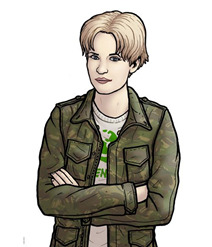
So… the regulars. Well, I’ll save the main two (The Eighth Doctor and Fitz) for last, because they will be the longest. So starting with Sam Jones (and yes, they do the ‘Smith and Jones’ shtick about a decade prior to Series 3), and off the bat, she’s easily the weakest EDA Companion and a bit of a inconsistency. She often suffered from writers who wanted to write her as the worst extremes of ‘Vegetarian Political Activist’, who constantly bitches and moans towards everything without any proper tact. And I don’t mind characters who don’t believe in tact, Cordelia from Buffy the Vampire Slayer/Angel is one of my favourite characters, but when Sam gives her opinions on everything in a pessimistic attitude without a degree of optimism… yeah my enthusiasm starts to drain really quickly. Doesn’t help that she’ll flip-flop between being a lovesick puppydog for 8, cynical activist or just… woman. But I will say that when she’s written under the likes of Kate Orman/Jonathan Blum, Paul Leonard and Paul Magrs, I absolutely love her character. She’s perceptive yet bright, naïve but willing to grow, cynical but willing to bring in entertainment. And I will say that her backstory is a fascinating deconstruction of the ‘Perfect Companion’ trope that Moffat loved to overemphasise. She had been manipulated, used as a pawn and twisted by the Doctor (although this is accidental) from the events of the TV Movie, and the real/correct one is just a junkie that couldn’t wait to stick a Heroin needle if it was given in front of her. It’s tragic, especially considering that when The Doctor fixes all his companions’ timeline much later down the line, Correct Sam becomes the correct version and it’s revealed that this version never travelled with the Doctor and died of an overdose, despite Fitz knowing her experiences they had together. I also love her exit story in Interference, she had become more enjoyable near the end and the story is able to show her resources. Unfortunately, the inconsistency up until Fitz joins just left me too much having a cold taste in my mouth for me to love her.
The Regulars-Compassion
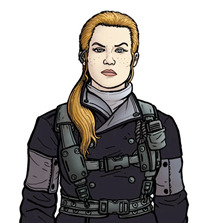
Next up, the human-TARDIS hybrid and Ice Cold Queen, Compassion. This is a character that I definitely appreciated way more after a first reading. The first time, I thought Compassion was too cold and aloof but on a reread, while she’s never going to be high on my list for favourite companions and I find her the hardest to analyse, I find that she works great as a hard-edged character, her dynamic with The Doctor and Fitz remind me a lot of 2/Jamie/Zoe, only if Zoe was way more upfront about her intelligence and rudeness. Her dynamic with Fitz as well is interesting as at first, they clearly despise each other for their clashing personalities and find each other untrustworthy but overtime, Compassion learns to enjoy Fitz’s goofiness and even learns to apologise. She can be destructive and violent with no emotion put behind it. That said, she becomes a more interesting character once she becomes the first Human-TARDIS hybrid, with the Doctor and Fitz forced to rely on her, but because of her cold hubris and after The Doctor forces a Randomiser thus violating her body, Compassion can become terrifying to The Doctor and Fitz. She does get brilliant material in The Banquo Legacy as well, with her possessing one person and her personality conflicting with the possessed person’s. And she has a decent farewell as well. Overall, I enjoy Compassion, it’s just really hard to analyse her considering that she only has 12 stories with the combination of perhaps a too subtle character arc.
The Regulars- Anji Kapoor
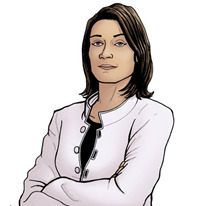
Now onto Anji Kapoor. If it isn’t for another companion that I’ll mention later, then Anji is certainly a close second in my rankings of 8th Doctor companions. And I also say with high praise that the 8th Doctor, Fitz Kreiner and Anji Kapoor team is my definitive TARDIS team… ever. You wouldn’t get that impression with her first story, as she has the trappings of an RTD Companion that you can pretty much guess a mile off. Stale relationship, life is going nowhere, working class, dead end job, jeez, I heard it all with Rose, Martha, Donna, Amy, Clara, Bill. The fact that she works in the stock market, an occupation I swear 98% of the population can barely figure out, and I felt like I was never going to like Anji. But Dang… Dang!!! The biggest glow-up happens in her very next story, and it practically sticks until her exit. I always felt that companions inbetween that period of Leela (arguably Tegan) and Anji never really basked in the pure absurdity of what world they were travelling in and never really gave any thought. The combination of new experiences around the universe and her haunting memories of her dead boyfriend was a lot to take in for her, to the point that she never really moved on (in Earthworld, she keeps writing emails to Dave, despite him being dead, and in Hope, she gives the secrets of the TARDIS over to the inhabitants on the exchange that they clone her boyfriend). She fell from grace multiple times, but with the Doctor and Fitz’s help, she was able to pick herself back up before spiralling down. What I love about Anji is despite her caring for The Doctor, she’s very distrustful to him because of his calculating and alien nature and both conflict with each other, their arguments almost feel too real. Anji often considers the options and is usually independent with her financial skills and intelligence. Over the 25 Books she’s in, she has become consistently enjoyable and a delight to read. Witty, clever, full of instinct, and humane, I did feel a proper sense of loss when she left.
The Regulars- Trix Macmillan
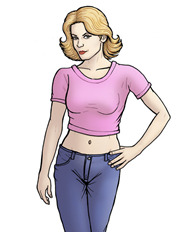
On the last companion, Trix Macmillan. She’s probably have the least amount of books in comparison to other EDA Companions (Sam had 25, Fitz had 51, Compassion has 12 and Anji had 25), with her only having 9 Books. Certainly not a lot of time to flesh out her character in comparison, but somehow the writers did it. What I love about Trix and what makes her a stark contrast to the first EDA Companion, Sam, is that Trix doesn’t want to be popular or well-liked. She’s logical, calculating, often devious, and often pretty tactless. She’s the kind of person who would steal a dead person’s identity and money. She treats The Doctor and Fitz not as friends, only acquaintances. But not just that, she can be (intentionally) a walking contradiction. Much like a showbiz actress, depending on what environment, time and crowd she’s working with, she’ll immediately change her personality. To the point that Trix doesn’t even know her true personality, and she is scared that she wants to know what she used to be. She likes being anyone but herself, wanting to become inconspicuous around the Doctor. Her relationship with the Doctor is interesting as well, he is judgemental towards her hobby as a conwoman, believing that she’s only with him and Fitz because she’ll steal whatever she can get. But as time goes on, he learns about her contradictory personality (most likely relates because of his own contradictory personality), and sees her, the real her. And despite her trying to detach herself from The Doctor, she slowly, but surely, opens herself more to The Doctor and Fitz, to the point that she feels hurt when The Doctor accuses her. Even with the short runtime, I found her relationship with Fitz to be really touching, and shows that Fitz’s open loyalty works in tandem with Trix’s cold secrecy. We don’t get much information about her past, but in a way I enjoy the lack of answers, whether she’s just a conartist or perhaps a chameleonic alien, what her relationship was like with her father. And maybe that’s the point, with her shape-shifting and unpredictable personality, she’s meant to be an enigma. At the very least, with 9 books, she had become a fascinating character that was wonderful to read and analyse.
The Regulars-Fitzgerald Kreiner
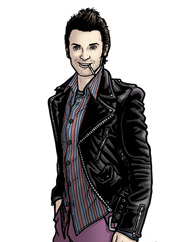
Now, my favourite companion in all of Doctor Who media, Fitz Kreiner. Better than the likes of Jamie, Donna, Sarah Jane, Ace and Evelyn. Before with Sam and The Doctor, the books were of varying quality, but as soon as he was introduced, even with a bit of a terrible debut story, he brought such humour that made the story just about bearable. He’s a bit of a goofball with some addiction for cigarettes and alcohol, but he starts becoming one of the most complex and special characters in the franchise. He begins as a bit of a James Bond-esque ‘Lady’s Man’, often trying to flirt and womanise, but by his third Book, Revolution Man, the development truly begins. He gets kidnapped, tortured and brainwashed under the influence of alien drugs and forced into shooting a man, with the Doctor forced to finish the job off for Fitz. He’s obviously going to have lasting effects that will damage him in the long run. But Damn, it doesn’t stop there, Interference leaves him in the absolute gutter with him being trapped in a membrane for 600 years, and resents the Doctor for failing to rescue him, and joins up to 8’s longlives enemy, Faction Paradox, and is converted to be a monster, becoming Father Kreiner. And it’s tragic, given his PTSD shown from Revolution Man. But that Fitz is gone, and what stays with the Doctor until the end is a clone of him, with full memories and everything. So thankfully, the loveable oaf never truly went away and only gets better from here. Much like how the 2nd Doctor was perfect for Jamie, or how Ian and Barbara are integral for the 1st Doctor, Fitz is ideal for 8. During the period with Compassion, he wants to prove that he’s the real Fitz, but can’t, because he isn’t. He may have the OG Fitz’s memories, but he can’t dream and thinks that some memories are missing. Even some aspects of his personality are different, like his skills of hiding and blending in easier. He may be a doofus, and hard to catch on certain things, but much like Jamie, he’s street-smart, and is able to spot simple situations that The Doctor wouldn’t give a second notice because of his desire for over-complicated situations. Even with him not being as bright, he’s able to hold off on his own from the Doctor, as in Trading Futures, he’s able to defeat Time Lord-wannabe Space Rhinos (no, not those kind of Space Rhinos) on his own without any of the Doctor’s help or knowledge by impersonating the Doctor, even willing to sacrifice himself. He’s the flame behind the EDA’s for me, the one who is willing to sacrifice everything he has to save whoever he considers family, and the bond that the Doctor and Fitz have together is inspired. He is fiercely loyal to the Doctor, even when he is kept in the dark. They both have a connection towards each other, like a mix between 2/Jamie and early 8/Charley, with Fitz even willing to hold the heavy memories of what 8 did to Gallifrey, even when The Doctor threatens to break every bone in Fitz’s body. He was the best friend that 8 could ever have, I loved their kindred relationship and it was totally worth it having Fitz for 51 Books to become such a developed character. My favourite companion, bar none.
The Regulars-The Eighth Doctor
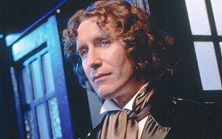
And now, finally the Eighth Doctor. Before, I used to cite the Eighth Doctor from Big Finish as the definitive incarnation. And don’t get me wrong, I still love him in the Charley, Lucie and even the Doom Coalition era. He has brilliant gravitas in showing intelligence (arguably the most intelligence since the 4th Doctor), dry morbid humour, the right amount of patronising, and enthusiasm, often excelled by McGann’s excellent performance and Shakespearean voice. But, as time goes on, the era becomes more… how do I say… schizophrenic and uneven. Big Finish sort of starts off creating arcs for 8, but then… sort of wander off and never pick up on arcs they’ve created, like the 800 year maroon in Orbis, the angst in Dark Eyes, then finally culminating with Moffat’s Night of the Doctor, not picking up on his hatred for the Daleks after Lucie Miller’s death, and making him too naïve to the Time War, making it as if his journey from BF didn’t even matter.
Then came my experiences with the books. And discarding the first novel, The Eight Doctors, and jumping straight to Vampire Science, Jonathan Blum and Kate Orman immediately gave 8 more nuance than 75% of 8th Doctor material in BF. I should preface by saying this as well: despite my grievances from the Virgin New Adventures, I still think that the character of 7, Time’s Champion and its character work are still crucial to the EDA’s and how it conflicts/supplements 8’s character. 8 is no longer Death’s pet, stuck to the chains of fate, but much like 7, in the eyes of others, he is simultaneously whimsical, dangerous and manipulative, albeit more flawed than 7. When 7 manipulates, it’s more out of logic, thinking about the bigger scope, while with 8, it’s out of passion and love. He often uses his good looks and often childlike grin as a front to scheme, as evidenced in Genocide. But unlike the 7th Doctor, it’s never constant to the point of predictability, and sometimes, even his manipulation messes up due to his conflict with his passion and childlike personality. I’d argue that 8 is the most anti-hero incarnation of all the Doctors, even more than the 7th Doctor, often obliviously selfish, privileged and at times very toxic and callous. He often doesn’t let other people in on his schemes (him faking his own death to his companions in The Banquo Legacy), often clings onto people out of fear of losing them (Sam in Interference), pulls strings for his selfish needs (uses Alan Turing’s sexuality as blackmail to make Turing help him help aliens but on the basis that the Doctor just escapes Earth in The Turing Test), puts others on the brink of death (orders a possessed wasp-human hybrid to kill one of his closest patients to test if his true personality is still there in Eater of Wasps), often be cold-blooded and violent (throws a medic against the wall head-first and then stuffs him in a cupboard in Vanishing Point). In the second half of the Book range, he had lost his memory from his battle and destruction/erasure of Gallifrey, but here’s why this memory erasure works as opposed to other ones, like in Big Finish. For Big Finish 90% of the time it’s used, it’s often to create false tension. At times, it’s fine, but when it’s used constantly to pad out the runtime, my enthusiasm starts to wane out quickly. But Justin Richards as Book Script Editor brings something interesting. For the first time, the Doctor isn’t bitching about where his memory is, but rather, he’s a mirrored version of the 1st Doctor (my second favourite incarnation): full of rage, irritative, deceptive, arrogant and willing to fill his hands full of blood. The difference is there is no Ian or Barbara to hold him back, to make him grow, 8 must be the one to grow and develop himself, he has to make the work into becoming The Doctor. That’s another reason why I adore the 8/Fitz/Anji team so much; they are all broken, damaged people with flaws, and call each other out. But they are also a trio of friendship, love, can bring unity towards each other and most importantly, feel like a family, in fact probably the most family-like team since arguably 2/Jamie/Victoria or even since 1/Ian/Barbara/Vicki. 8/Fitz/Anji have truly descended into tough times (Fitz especially), but this team shows that you can pull yourself back from the depths of hell when you have the right support going for you.
Writers like Lance Parkin, Paul Leonard, Lloyd Rose, Kate Orman, Steve Lyons, Mags L Halliday, Martin Day, Lawrence Miles live and breathe the 8th Doctor, a true Bryon Romantic, poetic and literal with words. He’s a diplomat, rather than a conqueror. He may be brutal, manipulative, and cold-blooded, but it’s equally mirrored with empathy, mischievous humour akin to the 2nd Doctor, and a lust for the unpredictability of humanity. Yet unlike how Modern Big Finish and Moffat’s Night of the Doctor made 8 into an ineffectual pacifist buffoon, Book 8 is certainly an optimist, but he’s also a realist. In Reckless Engineering, he was given the choice between saving the correct timeline in the universe but at the cost of his friends or let the universe collapse… he actually chooses the universe. It’s a shocking moment (especially for Fitz, considering how long he’s been with the Doctor), but even he knows that, but has a responsibility to save the right reality. And with some introspection, nearing the end, he realises that, because there’s a gorgeous insight in The Sleep of Reason, about focusing too much on the bigger picture and the few things is equally as important. To see 8’s goals come to fruition, he brings it to himself that his mission of helping even just one individual can be seen as the greatest thing in the universe. He doesn’t want to remember the events of Gallifrey near the end because at the end of the day, he’s a man who strives for the present and future, not the past. He may not be a good person, he may not be right sometimes, and he may not have a happily ever after with destroying Evil for good, but he’ll still keep going on just to make a difference. That’s why I adore the ambiguous ending to The Gallifrey Chronicles, we never get a confirmation as to whether the Doctor survives his plan against the Vore, we never get what his plan is supposed to be and whatever happens after the battle (besides a song from Fitz closing off the book). I prefer Doctor Who to have an ambiguous non-conclusive ending than what Marc Platt did for Lungbarrow or Colin Meek for Death Comes to Time. This version of Eight has now become the definitive incarnation of The Doctor for me, I adore this character so much.
Conclusion

To me, The Eighth Doctor Books, especially in the second half, truly encapsulates everything that I love about the franchise: superb prose, introspective themes, emotional moments, pushing the boundaries of what Doctor Who could truly do but never accomplish. The writers made something special, and made the range one of the most suspenseful, sombre, intimate, and beautiful pieces of fiction I’ve ever experienced. I love them, and to me, they are my Doctor Who.
15 notes
·
View notes
Text
Book vs. Film
Far from the Madding Crowd (2015) is the first film I enjoyed MORE than the book it's based on – and here's WHY (spoilers):
The Characters
First of all, I loved the cast! Especially Carey Mulligan, Michael Sheen and Matthias Schoenaerts, three actors talented beyond compare and simply PERFECT for their parts.
The costumes looked realistic and were in tune with the characters wearing them. Also, the dialogues were true to the book where necessary but also optimized so they didn't sound too aloof or too simple without losing the authenticity of dialogues written in the Victorian era.

Bathsheba
In the book, Hardy describes a heroine who is mainly characterized by her independence. However, she's still young (early 20s) and makes mistakes. Whereas Bathsheba in the book sometimes comes across as rash and even downright cruel (almost every time in regards to the men in her life), Mulligan's performance shows us a prideful woman who is also a bit naïve which makes her a more relatable character than in the book and also more likeable. There are explicit scenes of her doing hard work and also making tough decisions which is clearly not expected from a young woman at that time. Mulligan shows us a her determination to to make a living with her farm and bring back it's former glory days through efficiency but also her insecurities regarding her new role as head of a household. It's easy to identify with her in that matter. Furthermore, despite of all the things that happen to her (the fire, her husband, etc.) she's never portrayed as a victim but as a capable individual who faces anything that life throws at her, never giving up true to her headstrong nature. Apart from that, Bathsheba is never intentionally cruel in the film which shows mostly in her relationship to Mister Boldwood. For one, the valentine she sends him is much more harmless than it is in the book (she wrote the words 'Marry me'!). We understand that it was originally meant as a prank for a man who ignored her so profoundly. This reminds us once more of her youth and naivety for not even thinking about the possible consequences of her actions. In the book, the idea to prank a man like Boldwood seems to come out of nowhere and furthermore out of a very dark humoured, almost sadistic corner of her soul.
Even though, her behaviour can be irritating in the film as well, we understand exactly why she's doing what she's doing. Again, Mulligan's performance is FLAWLESS!

Gabriel
As for Gabriel Oak, he's portrayed exactly the way he was described in the book. He had a good, loyal and true nature. His advice to Bathsheba is never forced or arrogant and their friendship is shown wonderfully through the years. It's not a love at first sight story, at least not on her part. But Gabriel ends up to be the man any working woman would wish for. He's there whenever she needs him, he offers support in work as well as morally. By the end of the film it gets clear that he's become her most trusted companion and the only one she can talk to about anything, despite having a female friend, Liddy, at her disposal. Gabriel furthermore is no stranger to suffering both emotionally in regards to Bathsheba as well as existentially speaking (that sheep scene killed me!). With every passing moment between them we realise that he's exactly what she needs and is actually looking for without realising it. Gabriel never judges her and stays by her side until the end. However, in the film he's quite quickly made the obvious choice due to cinematic reasons which I thought wasn't necessary.

Boldwood
William Boldwood's character is easily the most changed one from book to film. At this point, HUGE credits to Michael Sheen whose performance single handedly saves the character! Boldwood is Weatherbury's most eligible bachelor, rich, handsome and respected, in other words: for a woman at that time he's the obvious choice. Boldwood, however ignores her at the beginning which is something new for Bathsheba. It's also why she decides to send a valentine with a classic rhyme of roses and violets to Boldwood, intended as a joke. But Boldwood, a lonely man as we learn reads much more into it and asks her to marry him. In the film, she lets him down gently, explaining that she made a mistake and does neither want nor need a husband. Still, she promises him to at least think about his proposal. In the book her actions are far more egoistic. She doesn't let him off the hook at all until she's accepted Troy's proposal. In the meantime, Boldwood has fallen madly in love with Bathsheba and is trying rather desperately to get her to change her mind. In the book he even goes so far as to find Troy and beg him not to marry Bathsheba, even offers him money. I hated this scene in the book for it's disrespectful towards Bathsheba and makes Boldwood much more pathetic than he is in the film. While Boldwood appears rather desperate in the film as well, he's not nearly as creepy as he is in the book where his behaviour gets almost stalkerish. In the film we see an older gentleman who's hopelessly in love and absolutely heartbroken by Bathsheba's rejection, however, he respects her decision. Also, there are some extra scenes between Boldwood and Gabriel which let us see that Boldwood is actually a man of good character but doesn't handle rejection well. What makes it even harder to watch on his behalf is the fact that the film gives us moments that indicate that there is something building between Bathsheba and Boldwood (or could be but she decides not to let it happen) whereas in the book their interactions consist of him turning up at her doorstep unannounced and unwanted with her being too polite to send him away. After Troy's disappearance, Bathsheba's farm falls into an existential crisis and Boldwood offers to help her out financially under the condition that she marries him. While this move is much closer to the Boldwood in the book it's somehow made understandable by what we've seen of him until this point. For Boldwood, Bathsheba represents his last chance at happiness or else, so he feels, he's going to die alone. I have no doubt that Sheen's Boldwood is just as obsessive as his book counterpart and therefore would have been the wrong choice for Bathsheba. But in contradiction to book Boldwood, I actually felt sorry for the man. His ending surprised me in the book, as well as in the film for I had originally anticipated that he was going to kill himself eventually. When he killed Troy I couldn't help but think, well, good riddance but Boldwood, in my opinion deserved better.

Troy
The film also does Francis Troy a lot of good. We get to see him suffer from bad timing and jumping to wrong conclusions in the film which makes him appear nothing but human. That doesn't change the fact that he's still the obvious WRONG choice but we get a better view on Frank's personality and his internal conflict. I still didn't like him but as with Boldwood, I felt sorry for him at some point. Also, in the book I failed completely to understand what Bathsheba saw in him of all men but watching the film I did. Her choice to marry Frank does not contradict with her independence and freedom because she thinks that she's in love and that's all she wants/needs. She's head over the hills for this daring soldier who doesn't court her like a gentleman (like Boldwood in the film) but openly pays her compliments and after a short while, to put it bluntly simply goes for it. Bathsheba is a stranger to such passion and it whisks her off her feet. The fact that Troy is a gambler and a drunk only comes to light after their wedding which is realistic as well as dramatic for it takes us (and Bathsheba) not long to realise that she made a mistake. In the end, Troy gets what he deserves, rightfully so in regards to Bathsheba, however, as with Boldwood, he appears more human in the film then the book and his actions are at least comprehensible. Again, I'm so grateful they left out the scene between him and Boldwood!

2. The feminist idea
I think for Hardy it was essential to let his heroines suffer which makes sense in a way that any woman who dares to swim against the current especially at that time is mostly met with criticism and rejection from society. After Tess of the d'Urbervilles I think he was rather mild on Bathsheba. Still, it seems logical that a feminist woman at that time would face the same obstacles as any woman but with a different focus. For one Bathsheba is described as an independent being who faces judgement because of that from the very beginning. Second, as she takes over her uncle's farm it seems that nobody expects her to do actual work. The same goes for business on the market, the man's world through and through which is shown perfectly as she enters the room and every man turns to stare at her as if her mere presence is a scandal. Her first day on the market is shown from her perspective and the reactions of her male competitors are just what you'd expect. When she names the price for her corn, her first customer immediately tries to beat down the price. It's Bathsheba's first test and she manages just as well as a man would by not backing down. I felt like the feminism came across better in the film because it was shown more explicitly, whereas in the book it works as an underlying theme which is not a bad way for a book but wouldn't work in a film. Instead, the film chose Bathsheba's independence as a theme, romanticising it a little bit but again, for a film this works rather well.
When it comes to marriage, Bathsheba seems to hold her own very well, too as she rejects two men's proposals regardless of how good a match they appear to be. With Gabriel she fears that he would not be able to handle her nature and “grow to despise [her]” which some see as a weakness but I felt it looked like a strength of a woman who knows herself. With Boldwood, she's in no need of a husband and makes clear (on several occasions) that she doesn't need a protector which Boldwood would very much like to be for her. Bathsheba is perfectly capable of looking out for herself and the men at that time (some still today) are not used to that. Through this theme, the film and the book show us that as soon as a woman doesn't NEED a man the man quickly runs out of reasons to convince her of marriage at all which underlines the fact that at that time it was mostly about tradition and standard and hardly ever about love but of women being dependent on men.
The film's theme is also beautifully laced into almost every scene, for example at her farm's gathering where Bathsheba plays a song which sums up her entire world view:
“Beware, beware keep your garden fair
Let no man steal your thime....”
However, in the end Bathsheba learns that she does indeed need help from time to time but is too proud to ask for it. It's Gabriel that makes her overcome said pride and in doing so, helps her to grow. Gabriel is the one man whose loyalty stays unwavering and yet he's also the man she runs after twice. Gabriel is the man she needs but it takes her a long time to realise that because she's actively fighting it as to accept it would mean the end of her freedom to her. It's ironic that she traps herself in an unloving marriage with Troy but she does so believing to make the right choice for herself which is realistic in my opinion for she's only in her early twenties. When Gabriel confronts her with her naivety she reacts angrily for she feels as if he's attacking her as a woman and therefore eroding her authority which she cannot stand. But here she's in the wrong because Gabriel is only worried for her well being which she doesn't recognise until the very end. In her fight for her independence and freedom Bathsheba has lost her way and sees attackers where there are none which is shockingly realistic. Therefore, I feel it's unfair to judge Bathsheba by her reactions which are when you keep her position in mind quite understandable. And yet, Gabriel stays without judging or belittling her which is why it had to be them in the end.
#i did a thing#book vs movie#far from the madding crowd#Carey Mulligan#michael sheen#matthias schoenaerts#feminism#femisim in books#thomas hardy#bathsheba everdene#gabriel oak#William Boldwood#frank troy
7 notes
·
View notes
Text
Okay, today has been a quiet Saturday morning so far, I have some time, and I like lists. So here is my random (personal) ranking of Star Trek series and movies, out of what I’ve seen, which is everything but seasons 5-7 of Voyager, all of Enterprise, and all of Picard. I’m only counting shows with three or more seasons because it’s easier. But let the record show that I love Lower Decks so far and The Animated Series is actually a blast.
SPOILERS THROUGHOUT
Series Ranking
The Original Series - As influential of a show as it is, I constantly forget how much damn fun the original Trek is. There is an almost Community-like variance in tone and genre throughout the show. And I’m a sucker for a future that embraces primary colors. It is the Trek show I revisit the most so far, and it remains my favorite.
Deep Space Nine - This one comes close, though. It starts out as a solid spinoff with very well-defined characters, and then becomes a big, sprawling epic that had my eyes welling up by the end. It feels more like a sequel to The Original Series than The Next Generation did to me. It dealt with subject matter both different and darker than was expected for the time. It had characters at odds with each other. Religion was explored in a way that balanced brutal honesty with genuine respect. War and the various traumas it induces were acknowledged. And it had “Take Me Out to the Holosuite”. I only finished this one recently but I look forward to watching it again.
Discovery - I was rooting for this show to be good even as it went through so much behind-the-scenes drama during its first two seasons. Even with all of that going on, the show became a fascinating watch as you saw it change from its arguably-too-dark beginnings as a prequel, to the almost Doctor Who-like second season with its joyful embracing of classic Trek, and finally to its current iteration that at long last gives us a Trek show that’s not bound by prequel limitations. Michael Burnham is such a great character and getting to see her arc alone makes this one of my favorite Trek stories. The queer/nonbinary representation also warms my heart.
Voyager - I’m just starting the fifth season, but the show has settled into an interesting groove with its characters. And Voyager’s characters are so damn good that they counterbalance a lot of the show’s early problems. It takes a while for Voyager to realize that the Kazon do not work very well as villains. But once the show realizes that, it begins an upward trajectory in quality that reminds me of Deep Space Nine after it began doing Dominion plots. And Seven of Nine’s effect on the crew dynamic lives up to the hype. Any scene between her and Janeway demonstrates such a unique relationship between captain and crewmate that an episode plot can be meh and still worth it for a scene with those two. Also, Janeway is the best captain character. No other Trek show (that I’ve seen so far) comes close to showing us the weight of leadership like Voyager, and Mulgrew constantly brings it.
The Next Generation - This is my first Trek show. It’s the one that my dad watched. There are several standout episodes to me, but I find myself less drawn to revisiting TNG than the other Trek shows because ultimately it took me too long to understand and care about its cast of characters. If you were to ask me to describe any character from any other Trek show, I would be able to. Ask me to describe a TNG character and I would likely fail to give any good adjectives for any character besides Data and Worf. As iconic as the show is, and as great as it became, it doesn’t have the same pull on me as other Trek shows. But it was the template for the spinoffs that followed, and the portrayal of Picard’s trauma post-Borg assimilation earns its reputation as an all-timer for me.
Movie Ranking
VI: The Undiscovered Country - I’m surprised this one isn’t talked about as much as other Trek movies. It’s a very frank depiction of prejudices and learning to deal with them. It has one of the best Kirk/Spock scenes ever. Christopher Plummer as a Klingon. The ORIGINAL cast credits sign-off (yes, Avengers: Endgame borrowed from this). A score that carefully balances menace with eventual hope. A fun whodunit structure. I could go on and on. It’s just so damn great, and so far the only successful send-off to a Trek crew in any of the movies.
II: The Wrath of Khan - It’s a classic for a reason. I’ve probably rewatched this more than any other Trek movie. You got your great villain, your classic crew beginning to deal with their mortality, an all-timer death scene, a kickass early James Horner score. What more could you want?
The Motion Picture - This is an interesting one. When I first watched it as a teen, I hated it. I agreed with every critique of it being thinly plotted and having an excessive runtime. When I revisited it in my 20s, it became a favorite. It’s Star Trek’s exploration of existential dread, and the struggle to find agency and identity within that dread. It has possibly Jerry Goldsmith’s greatest score. It is the best that the Enterprise has ever looked. This movie envelopes you with eerie and epic imagery, culminating in a finale with interesting philosophical ramifications and a well-earned return to optimism from its crew. This one is criminally underrated.
First Contact - This one is just rock solid all around. The best-ever TNG villains, further exploration of Picard’s trauma from Borg assimilation, Alfre Woodard, Alice Krige, fun action, the genesis of the Federation. It has the best balance of darkness and fun out of all of the Trek movies. It also has a character actually say the words “star trek” in a way that never ceases to make me smile. I don’t know if it’s a good line, but it’s funny regardless.
Beyond - Like The Motion Picture, I initially disliked this upon first viewing. I was still in the middle of watching The Original Series and was in the wrong mindset for this mashup of TOS and Fast & Furious. But it’s one of the most underrated Treks because it’s a perfect balance of the more kinetic action found in the 2010s with a very well-done breakdown of the inherent point and value of Star Trek: learning to be better and move beyond fighting the same battles among ourselves.
IV: The Voyage Home - This one is such a satisfying culmination of the crew’s arc starting in The Wrath of Khan that the joy of the 1980s material is almost just a bonus to me. Nimoy does a good job of keeping things light without disregarding stakes. He gets the best portrayal of the crew’s camaraderie in this and The Search for Spock. And Spock’s reaction to the concept of “exact change” always makes me laugh.
III: The Search for Spock - I revisited this one recently and it held up better than I expected. Seeing the weight of Spock’s death on Kirk in the beginning hits hard. Christopher Lloyd as the Klingon villain is casually one of the best Trek movie villains. And seeing the crew uniting over trying to bring back Spock gives us some of the best on-screen moments of this cast.
Star Trek - One of the reasons I love Beyond so much is that it retroactively makes this one better. I was crazy for this movie when it came out. I was in high school, Star Trek in general was something I was only really aware of because of my dad. But this is the thing that got me into Trek. And as mixed of a bag as it now plays to me, ‘09 Star Trek being a gateway for me to general Trek, combined with the perfect casting of the crew, the excellent Giacchino score, and the emotion of the opening sequence, thankfully makes this one still a blast to revisit.
Nemesis - I have only seen this twice, and both of those times without having seen TNG in its entirety. This was also the very first Trek movie I ever saw. Nostalgia is a factor for why this is higher than the others on the list. Curiosity is another, as I was unaware of Tom Hardy when I watched this, and have no idea what my opinion will be on rewatch. But what I always remembered of this movie was its ending, which even to a novice like myself when I first saw it had an impact.
Generations - There are quite a few great scenes that Stewart gets in this movie. Malcolm McDowell is also great in it. But the whole plot feels too forced for me to get actually swept up in it. And as fun as it is to see Shatner and Stewart share the screen... it ultimately has no impact and leads to a strangely lame death for Kirk.
Insurrection - The idea of Enterprise going rogue against the Federation for forcibly relocating a population for a natural resource is such a good concept... which makes the goofiness and half-baked writing of this entry all the more confusing. All the elements are there, but it feels like the tone was forced to be lighter than the material warranted. It’s frustrating because Frakes’ directing chops that he showed off on First Contact are still visible here. But for whatever reason, this one just falls apart.
Into Darkness - This one is low on the list mainly because it represents almost all the negative traits of the modern blockbuster to me. Darkness without depth, franchise callbacks without substance, and no character development/change by the end. Another reason why Beyond works better as a sequel to ‘09 Star Trek than this one is that Into Darkness feels more like it’s trying to make Star Trek a bigger movie franchise rather than develop this iteration of the Enterprise crew. Nothing and no one is changed by the end of this story.
V: The Final Frontier - It is the most difficult Trek movie to sit through, and yet I can’t call it a disaster. For all of its misfirings on the comedy front (dancing Uhura, for instance), the camping material with Kirk, Spock and McCoy is genuinely great. The premise of its villain being on a quest to find God is ultimately a misfire, but it leads to a very engagingly ridiculous climax centered around the question “What does God need with a starship?” There are far too many undeveloped ideas in this one, but that scene is worth seeing this movie for. At least, now that we know it didn’t kill the franchise, as so many apparently feared when this came out.
4 notes
·
View notes
Text
What is the point?: Let’s start 2021 with an existential crisis.
Story time.
I teach a liberal studies class that I didn’t even take when I went to this same school. (I tested out with AP credits.)

So on the first day of class this semester, I asked my students why they were taking this class. I made it clear that “because I have to” is a completely acceptable answer. They did not disappoint in that category. In all fairness, that’s how a lot of my liberal studies and elective classes were picked as well.

Then it was my turn, and I had a far more articulate, thought out answer because I had the unfair advantage of knowing that the question would be posed ahead of time.

I teach post-secondary literature because storytelling is built into the human brain. It’s a universal activity. And in standard college prep K-12 we get taught all of this mainstream, pre-formulated literary theory. Now, that is absolutely necessary - to prepare you for the next step of then doing your own analysis.
We have to analyze stories all day long because of the aforementioned built-in story mode we have, whether the story is a movie plot, where your boyfriend says he was last weekend, or whether there are space lasers aimed at California. If you can’t process that information, you’re screwed.
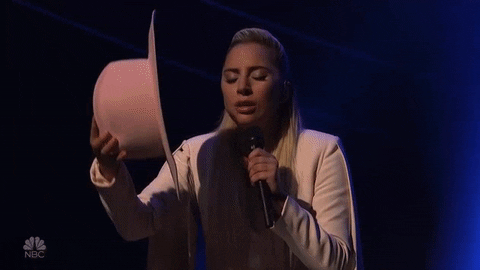
Now, if we turn to my inner self, you will find not a confident woman of letters, but rather a terrified millenial who remembers when Tom sold MySpace for $580 million and still can’t believe that people give her money, actual US currency, to guide people in an activity that is overall beneficial but does not 1:1 correlate with a skill you’d find on an Indeed.com listing.

Yes, you are becoming a more complete human being with your gen ed requirements. Yes, you will be a far less insufferable employee and coworker. Good luck spinning that in your interview. I might have to turn you over to the Comm people for that one.
And what am I even doing? Modeling and giving opportunities for practice. Employing Socratic questioning. Exposing students to new things.
Hold on. I’m actually talking myself down. Cool.

I’m about to tell on myself a little bit. That Baurlein article? The angsty one bemoaning the loss of the idealistic, probably-never-all-that-real, mentor-mentee relationship? I feel that. I have a lot of difficulty with interpersonal relationships (unexpectedly deep moment), but man if I didn’t wish for more direct guidance in how to become what I wanted to be.
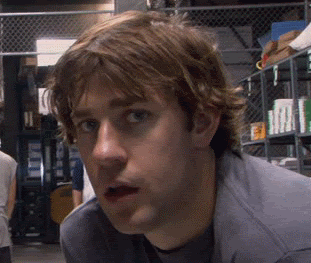
I was a little bit ready to throw hands with Drezner at the beginning of his rebuttal.
But he’s right. I know he’s right. The demographics have shifted, and we live in a very different social and economic landscape. It feels like the BA is the new high school diploma in a lot of ways.
Tiny digression: I found a job listing for a secretary position that required a BA and said something like “top 20 university preferred.” I died laughing and saved it. I’ll post it if I find it.
In our current world, post-secondary education is utilitarian, not a leisure activity. I remember reading The Help and being floored that girls would walk away from a university education to just get pregnant and organize toilet donations.
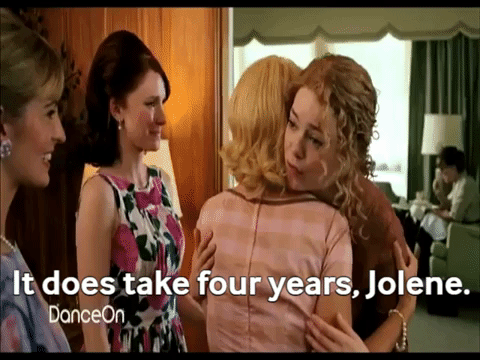
I just found out that my late grandmother went to college. If that woman ever had a job, I was never told. Meanwhile, in the year of our Lord 2021, I’m hyperventilating at the prospect of not immediately finding a job in my field. (CPCC, call me!)
My father is suggesting I learn computer coding. My mother keeps asking if it’s too late for med school. ($300 and four hours of my life “wasted” on the MCAT.) A lot of people theorize that my generation was the last one that went to college out of any sort of optimism. It’s bleak! I understand why I’ve got these kids reading Jane Austen purely out of obligation.
John Mulaney is not helping, by the way. (4:25 is your relevant clip. It stings.)
youtube
And after they read it, presuming they don’t lie to me and just Spark Note it, are we having a deep, meaningful conversation about the language and themes? Sure, if you consider an intimate gathering to be your thirty closest friends. Especially if only like three of those friends are chatty, and they’re all trying to talk to you instead of each other. In that context, the British mentor system described by Barre is a dream [and a source of anxiety (interpersonal difficulties, remember?)].
Every one of those anxious party guests has their own way of learning as well. Will I ever learn a Rubix cube by watching someone solve it or by reading an explanation? Absolutely not. I can make that unequivocal statement right now. I have to hold it, and I have to do it myself. But I still need a teacher. I just need the teacher to give me the steps and then step back and let me make a mess of the cube for a bit, step in if I’m going way too far in the wrong direction. The teacher is still necessary, though.

Maybe we need to go back to the one student, one teacher model. Like the Sith. That would really drive up tuition prices, though....
2 notes
·
View notes
Text
Custom Rule for D&D and Pahtfinder: Morale Points
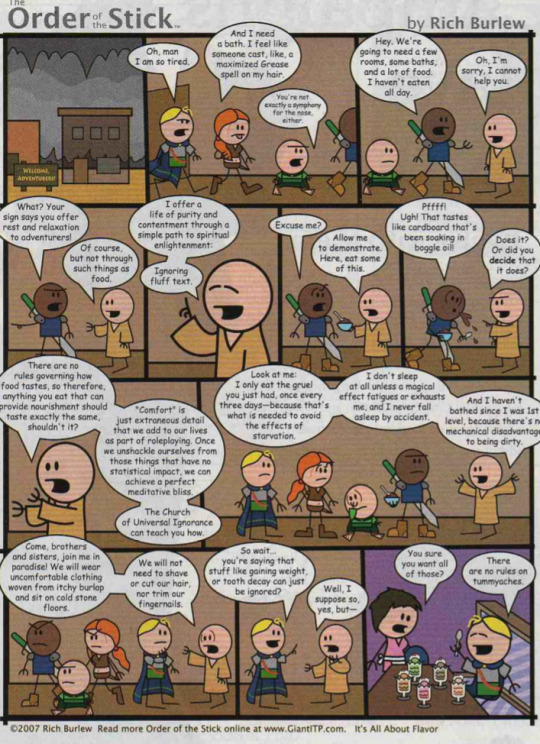
Using morale points:
Every character has a maximum morale point pool equal to the sum of their constitution, wisdom, and charisma scores (typically leading to 24-54 points). players cannot gain morale points above this maximum.
After rolling any type and any number of dice, but before the result is revealed, you may spend any number of morale points you have to increase the result, up to the maximum achievable on the die type. for example, when rolling a D20 for an attack roll or skill check, with a result of 15 on the die, and a +4 modifier, you may spend 1 point to achieve a final result of 20, insuring success at that DC, or if you suspect the DC might be higher, you may spend up to 5, for a final result of 24 if you think the task is more difficult, but you may not buy any higher than that since the maximum die result is 20. OR if you use a Cure Wounds spell and roll a 2 and a 5, you may spend up to 9 morale points to ensure the maximum result on those two dice combined (16), before any spell-casting modifiers.
Why morale points?:
"isn't this stuff already covered in the rules?" short answer; "yes, technically," but let's take a closer look at those rules;
"FOOD: A character needs one pound of food per day. A character can go without food for a number of days equal to 3 + (their) Constitution modifier (minimum 1). At the end of each day beyond that limit, a character automatically suffers one level of exhaustion. A normal day of eating resets the count of days without food to zero. " - pg 185 PHB.
So, according to rules-as-written a character could have one single meal every 3 days, or up to a week with a high enough Con modifier, and suffer no penalties. Zero. none. Not even a headache. your adventurer is not a python!!! this is not how food and water work in real life! It should NOT be how it works in-game. while, yes, you can argue that this is the biological response, anyone who's gone a day (or more) without food knows that this doesn't represent the mental toll these obstacles can take.
Even if we ignore the incongruities already mentioned, it has always stuck out to me while reading novels like Game of Thrones or Lord of the Rings or just about every fantasy novel involving travel, that they tend to spend a lot of time describing the mental and emotional fatigue of living away from the creature-comforts of home and/or on the road. Sure! Frodo and Sam can eat Lembas bread all day, every day, until the elf finishes reciting his poetry, but it's not gonna raise anyone's spirits. sure, you've got piles and piles of fresh bear-meat to keep you fed, but it doesn't go down easy if you can't afford the time to start a campfire to cook it. there's a reason they only give bread & water when you're in medieval prison, and it's because it sucks. even if you have all your biological needs met, your brain needs flavor as much as your stomach needs calories. We've all experience that feeling of doing something you're not necessarily "bad" at, but optimal performance requires more mental resources than something you have a higher skill bonus in you are more familiar with, and while you are perfectly capable of the task in ideal conditions, (i.e. well-rested, hydrated, nourished, etc,), it becomes disproportionately difficult in non-ideal conditions (think about "hangry" or all those posts about existential dread turning out to be dehydration). It should be noted, you can experience all this without the "exhaustion" described by the core handbook, and that needs to be represented somehow. It also stuck out to me that these challenges are almost never included in rpg's in a way that is both meaningful AND fun. In every case I've ever experienced, it is either hand-waved and ignored, or examined in excruciating detail, halting every other aspect of play. With this in mind, I set out to design a set of rules that are substantial enough to affect the story and be worth tracking, while staying abstract enough to maintain a game's pacing. I want these rules to elicit the same “gods! I need a beer” or “I’d kill for a home-cooked meal right now,” sentiment you see from characters in most traditional media, with the same desperation the players think, “I’m out of hit points/spell slots, I need a long rest”. Thus, morale points. It should be said, that all of these rules are in addition to the rules-as-written, not a replacement.
regaining and losing morale points:
sleep: A minimum of 4 hours sleep in a relatively safe location (i.e. camping with an ally keeping watch, or in a barn or secluded alleyway) is required to avoid losing morale points. getting 8 hours of solid rest in a safe location will restore 1 morale point, and doing so on a bed will restore 2. for every night without sleep, or sleep in an unsafe or uncomfortable area, your character will lose one morale point.
food: while 1 pound of food will keep 1 character fed for the day, such as trail rations or a simple tavern meal, each GP spent on food will restore 1 morale point. your character will lose 1 morale point for every 24 (twenty-four) hours without sitting down for a meal. (Even a meal at half-rations can serve this purpose if it’s treated as a relaxing sit-down)
drink: every GP spent on wine, ale, or other good drink of your character's choice will restore 1 morale point. This can include smoking herbs, or other recreational substances like coffee or other drugs (fantasy or real), however, the 1gp per morale point exchange rate remains the same. a character will lose 1 morale point for every 6 hours without water.
random happenstance: rolling a natural 20 will restore 1 point, and a natural 1 will lose you a point. No “critical hits” or “critical failures” on skills or saving throws, only the auto succeed/fail and the morale point change.
good company: during a rest, 1 character may make a performance check. with a 10 or higher, each other member of the group may regain 1 morale point. on a result of 20 or higher, the group gets 2 each. 30 or higher gets 3, and so on. the performer can only regain 1 point on a 20 or higher (performing can be fun, but hard work) A result of 9 or less causes everyone involved to lose 1 morale point.
Going hunting: jerky, nuts, and dried berries in your rations may meet your daily protein requirements, but nothing beats fresh. During a rest, a character may make a survival check. With a 10 or higher, you may gain 1 morale point to allocate to any character, including yourself. on a result of 20 or higher, you may allocate 2 as you choose. 30 or higher gets 3, and so on. A result of 9 or less causes everyone involved to lose 1 morale point.
Going foraging: Spice is the variety of life - as a wise man once said, "a man can live on nutrient blocks from here to Judgement Day, if he's got enough rosemary". Any number of wild herbs and natural substances can be used to flavor your food or for recreational purposes. During a rest, a character may make a nature check. with a 10 or higher, you may gain 1 morale point to give to any one character, including yourself. on a result of 20 or higher, you may allocate 2 as you choose. 30 or higher gets 3, and so on. A result of 9 or less causes everyone involved to lose 1 morale point.
Emotional labor: during a rest, a character may make an insight check. with a 10 or higher, you can aid another character’s check to restore morale, giving them advantage on their roll. A result of 9 or less causes you to misread the situation. You grant disadvantage, and lose 1 morale point.
Pep talk: flattery and pretty words may not win battles, but they sure can brighten someone’s day, and isn’t that an encouraging thought? It isn’t? Ok, well, in any case, during a rest, a character may make a persuasion or deception check. with a 10 or higher, one other member of the group may regain 1 morale point. on a result of 20 or higher, the character gets 2. 30 or higher gets 3, and so on. The speaker can only regain 1 point on a 20 or higher. A result of 9 or less causes everyone involved to lose 1 morale point.
Minor treatments: Not every injury or ailment causes hit point damage or noticeable stat changes. It may be a minor allergy that makes you cranky, or a joint that gets just stiff enough to be annoying “but it’s fine i’m totally fine guys”, or that ringing in your ears that won’t go away unless someone rubs your jaw the right way. You’re not performing medical miracles, just the observations that can come with medical training. during a rest, a character may make a medicine check. With a 10 or higher, one member of the group may regain 1 morale point. on a result of 20 or higher, the group gets 2 each. 30 or higher gets 3, and so on. the care provider can only regain 1 point on a 20 or higher. A result of 9 or less causes everyone involved to lose 1 morale point.
Situational:
Ideals: seeing, experiencing, or doing somethingthat reinforces your ideals can gain you one morale point. Conversely, an extreme event, as determined by the GM, that causes you to question your ideals causes 1 morale point loss
bonds: you can regain 1 morale point by spending an hour or more with one of your bonds. If one of your bonds are injured or damaged, you must make a wisdom saving throw equal to 15+ the damage they suffered, or lose morale points equal to the damage they suffered. If one of your bonds is killed or destroyed, you lose all of your morale points when you learn about the loss.
Flaws: you can gain morale opints by acting on one of your flaws, at the risk of another character losing morale points. During a rest, you may choose another player character, describe how your flaw manifests, and choose a DC. then, the GM will assign a skill or saving throw for each of you (these may be the same roll or different) based on the situation. If you both succeed, you gain 1 morale point and the other character gains 0. If you succeed and the other character fails, you gain 2 points, and they lose 1. If you both fail the roll, you both lose 1 morale point.
hobbies: during a rest, a character may make a roll with a gaming set they are proficient in. with a 10 or higher, each other member of the group may regain 1 morale point. on a result of 20 or higher, the group gets 2 each. 30 or higher gets 3, and so on. If two or more characters are proficient in the same game, each participant can make this roll with advantage. A result of 9 or less causes everyone involved to lose 1 morale point.
Travel pace: traveling at Fast pace causes you to lose 1 morale point for each hour at this pace (think about running a marathon). Traveling at Normal pace causes no morale point loss, but no actions can be taken to restore points. Traveling at slow pace, stops for food, rest, and hobbies can be assumed as part of the travel time, but you cannot make stealth checks at the same time as checks to improve morale. You move at half speed in difficult terrain, and you lose an additional morale point per hour.
How many morale points should the players start with?:
if they're professionals hired for a daring assignment, they may understandably have full points. However, if they're independent agents, with no employment to speak of other than turning to adventuring, or starting out escaping from captivity, it would be understandable (though perhaps less fun) to start at 0. In most other, less-extreme circumstances, you may want to consult with your players, and choose a middle-ground such as half-maximum, or a percentage based on a wis or con saving throw (player’s choice).
19 notes
·
View notes
Text
Man’s Search for Meaning: A Review
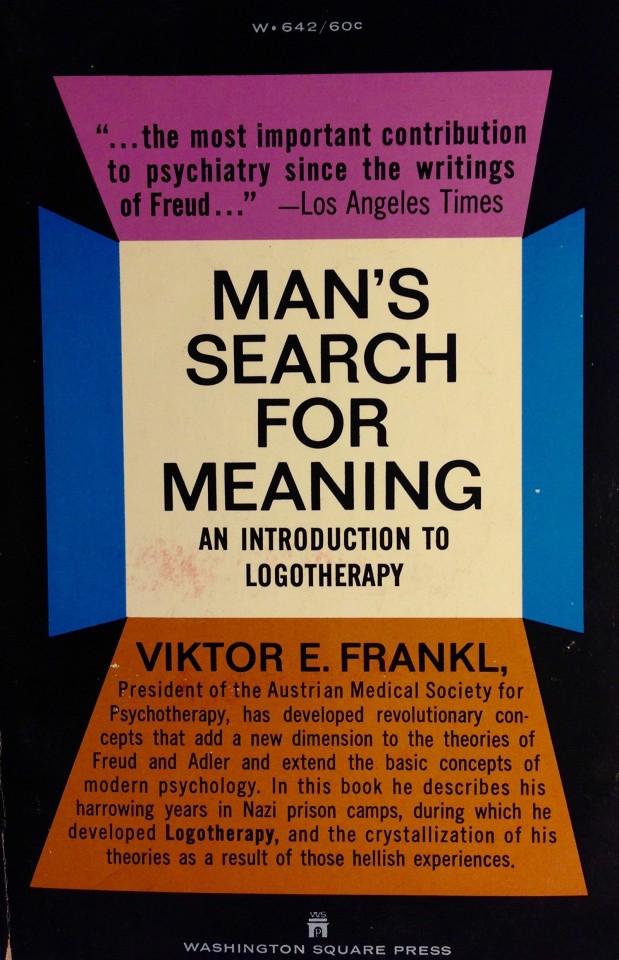
A quote from Nietzsche that says "he who has a why to live can bear with almost any how," perhaps can describe this book the best. Frankl continuously re-quoting it as he explained his extensive and comprehensive understanding of the phrase in the psychological matter. I would not be surprised if someone considers this book as "Victor E. Frankl's take on Nietzsche's teachings."
Half of the book is consists of Frankl's memoir of his experience in Nazi concentration camp while the last half of the book are explaining logotherapy, his teachings that he experiences himself in the camp with other prisoners. At first, I was half expecting suspense and thrilling horror sensation like in prisoner's stories but I get better storytelling of Frankl who tries his best in describing his experience as a prisoner in the most objective way possible so the reader and himself can study from it without immersed in unnecessarily horror.
Man's Search for Meaning isn't a preaching book that tells the reader about one way to live. Instead, it tells the reader that there is no absolute truth panacea and that every individual must have different meanings of their life as unavoidable suffering. It teaches that there are several paths to walk on with different goals to find the meaning or through tragic optimism.
According to logotherapy, we can discover this meaning in life in three different ways: (1) by creating a work or doing a deed; (2) by experiencing something or encountering someone; and (3) by attitude we take toward unavoidable suffering. (PART TWO: The Essence of Existence)
...tragic optimism that is, an optimism in the face of tragedy and in view of human potential which its best ways allow for: (1) turning suffering into a human achievement and accomplishment; (2) deriving from guilt and opportunity to change oneself for the better; and (3) deriving from life's transitoriness as incentive to take responsible action. (POSTCRIPT 1984 - The case for a Tragic Optimism)
Frankl believes that the meaning of life is the source of motivational force in man and that is not just a form of defense mechanism like psychoanalysis taught. There is a huge problem of an existential vacuum where a man can't find meaning in their life and thus resulted in an existential frustration or as he called it on his terms, a noögenic neuroses.
There are several referring to his theory that the reader might be missed on the first part in the second one, and he also linked it back to his teaching. There are also several comparisons and differentiation with psychoanalysis that he addresses in the book so it will be easier for the reader to understand the basics of his teaching. After all, the title of the second part of the book is "Logotherapy in a Nutshell."
While the first half book is an important reference for Nazi prisoners' experience and condition, I'd say that if the goal of reading is just to understand his logotherapy, it is very okay to just skip to the last half of the book. Though it would be very regrettable to skip on the memoir story and on how Frankl successfully deliver it in a very "objective academic" way even though he said it earlier in the book that what he wrote is indeed not a fact but a memoir of his own experience based on his point of view and subjectivity.
Unfortunately, his teaching can be easily manipulated into a toxic positivity we might encounter in modern motivational acts and speech. Many people consider it as a way to take everything blindly positive and have meanings even though Frankl himself already mentioned that his techniques cannot be applied to all sort of cases (like how paradoxical intention can only work best on phobia and compulsive disorder cases) and that he already stated:
But let me make it perfectly clear that in no way is suffering necessary to find meaning. I only insist that meaning is possible even in spite of suffering--provided, certainly, that the suffering is unavoidable. (PART TWO: The Meaning of Suffering)
My understanding of Frankl's logotherapy teaching is that suffering is unavoidable, but it doesn't mean that we have to suffer through it. We do have the capacity and willingness to get through it stronger and turn the suffering into a positive opportunity.
"Was mich nicht umbringt, macht mich starker." That which does not kill me, makes me stronger -Nietzsche
Overall my experience of reading the book is great as it opened my understanding of life even more. I found a lot of similarities with Frankl's understanding of life and suffering from Buddhism teaching on the first Four Noble Truths that made my reference even wider. I'd recommend this book for those who are in hopelessness state of their life and are trying to learn on how to live on. This is a good psychological-motivational book if one wants to take it as a motivational one.
#review#book review#review book#ebook review#review buku#viktor e frankl#logotherapy#man's search for meaning#psychology#psychological book#psychology book#motivational books#bookblr#ebook#ebookreader#ebooklovers#book and libraries#booklr#bookish#book#bookaholic#books and libraries#booksociety#books#psychoanalysis
5 notes
·
View notes
Text
Chasing Ghosts (and my boyfriends)
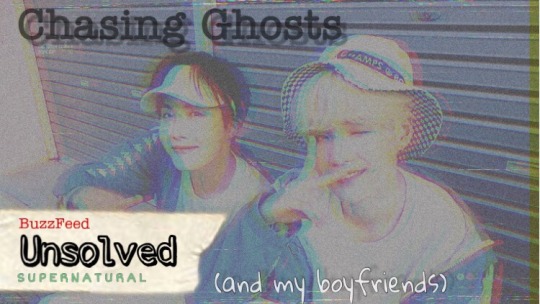
Note: I’ve been binging on Buzzfeed Unsolved waaaay to much but like, Shane and Ryan remind me so much of Yoongi and Hoseok I’m just doing god’s work yall. Might turn this into a drabble series, might not?? Lemme know what y’all think.
Plot: Nobody ever told you joining the Unsolved department would result in you being together with a sarcastic dumbass and the biggest coward on the planet. You wouldn’t change it for the world
Pairing: Yoongi/Reader/Hoseok
Word count: 2.6K
Genre: Fluff, drabble, attempted humor, poly relationship, buzzfeed!au
----
“Alright it’s rolling.”
“Sh! He’s already paranoid as fuck. Over here.”
You let out a giddy snicker as you gripped the camera tightly, filming your boyfriend Yoongi who was currently mirroring your crouched position. Waddling his way with the utmost determination you had to applaud, your thighs however, were already burning in the uncomfortable position and you were well aware this couldn’t have been good footage for the show.
But it was such a funny idea you couldn’t resist it when Yoongi had kept poking your sides with that dumb gummy smile that made you melt.
The topic matter at hand though was not so melt worthy, to Hoseok at least, who suddenly gasped out. Rightfully so due to Yoongi being an asshole, knocking his hand against the wall three times, “G-guys?” Hoseok whimpered out, you could already imagine his lips quivering while parted and his eyes blew out wide, “Y/n? Yoongi?”
You had to resist the urge to laugh due to partially feeling bad, your other boyfriend was the biggest coward you knew, but that was what had made him so endearing. Hoseok was already making his way over to the sound of the knocking, his flashlight in hand as Yoongi jumped out, screaming. His voice matched Hoseok who had jolted so hard he fell backwards onto his ass, “Holy fuck nuts! What the fuck! That wasn’t funny!”
Hoseok had immediate objections to your prank as the camera fumbled in your grip, you kept laughing despite his gaze shooting to you with puppy like betrayal. You couldn’t help it though, he was just so darn cute when he got scared, “You guys are such assholes! You know I don’t like this place.”
Yoongi had already pulled him up off the ground, howling out with laughing as he wrapped an arm around him, “C’mon on that was funny, you have to admit it. What did you think I was? A haunted door? Ah yes there’s nothing more painful than being shut in half”
“In half?” You wheezed out, “I don’t think that’s a thing.”
Hoseok was giving his signature nervous laugh as he relaxed into Yoongi’s grip, “Y-yeah I did actually,” he sputtered indignantly, “I can only hope with your insufferable ass here, maybe he’d be doing me a favor.”
After finishing your rounds of laughing you had all began making your way further into the house until you found the parlor on the second floor- See somewhere along the lines in your life you thought it would be hilarious to apply as a buzzfeed worker, well technically it was for journalism, who wouldn’t wanna write about 12 GIF’s that describe your existential crisis while in the shower, or what scented candle matched your personality the best? You didn’t think you’d actually land the job.
How you ended up in the Unsolved, department was beyond you. But what were you supposed to say when your boss asked if you wanted to be apart of a show where you got to go to haunted places all around the world, for free.
Well it wasn’t free obviously, but the expenses were paid for and that was the best part about it, okay so it wasn’t the best part. The best part about your show was how it had introduced you to both your wonderful dumbass boyfriends that shared one whole braincell with you, and you wouldn’t have had it any other way.
You had dusted off your chair as you placed it between them, Yoongi on your right and Hoseok on your left as the cameraman gave the thumbs up clearing you for recording, “Brrr, a little chilly in here already.” Yoongi commented, sarcasm invading his voice at Hoseok teetering around, his eyes flickering around as paranoia set in.
The room, was like any other room at a haunted area, musty and dust coating everything, some of the wallpaper had been stained and peeling and their was plenty of debris on the floor. You weren’t a nonbeliever in the supernatural, but you also weren’t a non believer. You had considered yourself a skeptic, leaned towards believing.
Except you radiated absolute chaotic energy with your over optimism in trying to find ghosts, you wouldn’t consider yourself taunting them, it was more like a...open minded approach in how you got them to communicate, where as Hoseok was always treading lightly. Yoongi on the other hand, was more likely to get levitated and yeeted against the wall with all of his smart ass comments and snide remarks to try and provoke the ghosts.
“It is man, do you not feel that?” Hoseok instantly replied, wrapping his arms around himself as he shifted in his seat, his eyes those cute dilated pupils, “Feels off here guys.” Hoseok looked towards the camera, laughing again with that nervousness on his face.
You laughed as you sunk into your seat, making yourself at home as you smiled at his endearing nervousness, “The only Off in here is from Yoongi since he couldn’t stand the mosquitoes outside.”
You all began laughing again as Yoongi chimed in, “It’s a valid fucking concern mosquitoes are real, they drink your blood! You don’t see Ghosts running around trying to snack on my ass.”
The wheezing got louder from both you and Hoseok as you slapped your thigh.
“Jot that down for our new bumper sticker,” you laughed towards the camera, excitement running through your veins at the realization kicking in that you were officially at the haunted attraction and not just for an investigation, no you’d be spending the night, “Alright, why don’t you tell us the rundown? Who are we hunting for today?”
Hoseok had began to tell his tale of the haunting of the house, apparently this had been a psychiatric ward back in the 17th century when the medical field had still been developing. Various of the doctors had used the patients on rather, well unfortunately painful and useless operations and experiments. The body count of the tortured souls was over seventy five in counting and that was only the ones confirmed, some of the doctors and nurses both had also commited suicide throughout the years, legend had it you could still hearing them walking down the halls.
The large estate was eventually bought and renovated after it was closed for inhumane treatment and intentional homicide, ever since the house had been passed around like a hot potato from renters due to paranormal activity, ominous and foreboding feeling they had gotten while living here.
Naturally after your banter had finished clowning the previous owners you had all gotten up too explore, stopping by one of the more spooky rooms where apparently one of the patients had died in an electroshock therapy that was a little too high in voltage.
“If brain exploding guy is present in this room, make yourself known to us,” Yoongi clacked his tongue, pushing his hands in his pockets as Hoseok began objecting, “You can pop a light bulb, make a sound or noise, preferably throw him out the window but- y’know I’m good with whatever.”
You had already began snorting a laugh as Hoseok flailed his arms about while muttering a ‘jesus christ’, the poor boy was gonna have a heart attack one of these days because of you both.
It was silent for a moment as you all waited before you sighed, “I don’t think he wants to talk about the brain thing, it’s a bit grueling y’know?” You waved your hands against your head as you gave a grimace, “I’d like to think it’s like having a migraine- but like…on steroids.”
“Steroids that make your fucking head explode?” Hoseok curved a brow, but you began wheezing a laugh as he waved his hands about, “One of these days you’re both gonna get throat punched and I’m just gonna stand there and laugh.”
You and Yoongi were already laughing though as you began to make your way out of the room, you had all began shuffling room to room, occasionally getting some responses though most were so distorted it was difficult to make out what they were saying.
Finally you had sat down in the most active room, setting up your flashlight as you opened the conversation, “If there is a ghost here present with us, we’re going to ask you some questions now. There are some rumors surrounding your death, if you were murdered, could you turn on the flashlight for us?”
Hoseok was practically pale in the face from holding his breath as you all watched the flashlight do nothing, after a few more seconds he exhaled in relief, “If you commited suicide, can you turn on the flashlight?”
It was another ten seconds before Yoongi scoffed, crossing his arms as he waltzed over to the flashlight that laid against the old stacked cardboard boxes, “What a fucking wimp. If you were at least a decent ghost you’d be able to flick the light on.”
“Dude shut the fuck up!” Hoseok almost squealed out, bouncing on his feet as his eyes darted across the room, you had began howling out laugh as he nervously teetered closer to you, jumping at a thump in one of the other rooms as he grabbed your hand, “Do you want us to die?”
You had kept laughing as you coo’d at Hoseok who kept looking at both of you like you were insane, wrapping both your arms around his as you gave his bicep a pat, “Okay, okay fine. Jokes aside, ghost, if you want to throw me and Yoongi out the window just flick that shit right on.”
“Y/n! No sto-” Hoseok suddenly screamed, jumping in your grip as the flashlight instantly flicked on. Yoongi took a step back as he kept laughing, not looking the least threatened as he shoved his hands into the pockets of his jacket.
Tongue pressed into his cheek with that gummy smile as he continued your statement, “If you want to hurt me and Y/n, turn the flashlight off.” Hoseok was practically whimpering as he ran a hand through his hair, his shrieking heightened at the flashlight flicking off.
“Alright stop! Let’s just set up our shit and get to bed.” Hoseok whined, already grabbing the flashlight as he hauled ass out of the room leaving you and Yoongi laughing like no tomorrow.
You both followed behind before going into one of the doctor’s bedrooms, setting up camp for the night.
After mounting the camera to the wall you gave it a flick as you laughed out, “What if some paranormal activity shit happens? Like what if Hoseok just got his ass dragged right out of bed?”
“Hey! Why me?” Hoseok called out, slumping down on the bed as he hugged his pillow closer, complaining about you using him in your weird ideas.
Yoongi snorted a laugh as he dove onto the bed, sprawling out as he yawned, giving the camera a thumbs up as he ignored your distressed partner, “They’d be doing us a service.”
“Rude!” Hoseok howled out, tossing himself towards the side of the bed, his voice whiny as you laughed. Hopping down from the chair as you gave the camera a thumbs up before crawling onto the bed in between them both.
Most nights spent at haunts were long, mainly because Hoseok was awake the entire night, freaked out by every little sound he heard.
Tonight, wasn’t any different. Yoongi had been spooning you from behind, his nose nuzzled into the crook of your neck dead asleep. You however? You were on night shift, watching Hoseok stiffen, and if the room wasn’t so dark you were sure you would’ve seen the dilation in his eyes, “Did you hear that?”
You yawned, stretching your arms towards him, trying to pull him back against you but he wasn’t having it, “No…?”
He shushed you, popping up from his spot as you whined, your front body now cold without your other boyfriend to keep you warm, “Shh! There’s footsteps.”
You both quieted down for a moment, and that’s when you heard it. Large thuds above you on the second floor, it was like heavy boots trudging up and down the hallway. You weren’t gonna lie and say it didn’t creep you out, because it definitely did. But you were also a pragmatic person at heart, it could’ve been a lot of things. Albeit not a lot of things were very loud like that but...
“Oh my god we’re gonna die.” Hoseok’s breath hitched, his body shuddered as he flopped back down, looking like he was ready to stroke out. Why your boss thought someone with so much anxiety would make a good addition to Unsolved was beyond you. But your heart washed with remorse for him as you felt his hands shake against you.
The footsteps didn’t cease, constantly trudging across the ceiling, it was unnerving. Really unnerving, but your love for your boyfriend was stronger as you sighed, sitting up as you felt Yoongi shift, eyes cracking open sleepily at his personal pillow breaking away.
“Come on, let’s switch spots.” You coaxed, feeling too bad for nervous boyfriend. As much as you wanted to sleep between them, like you always did. You also didn’t want to see Hoseok have a nervous breakdown at the new constant sound. The great thing about having two boyfriends was double the cuddles. You felt invincible between both of their bodies at night. That being said it was usually easy to fall asleep during haunts, that was if Hoseok wasn’t such a scaredy cat.
“N-no I’m fine.” Hoseok tried to insist but you were already crawling on top of him, trying to shove him towards the middle. He was fumbling again, trying to say he would survive, obviously not wanting you on the edge of the bed.
Yoongi let out a loud exasperated sigh at the noise you both kept making, “Shut the fuck up and come here you baby.” grabbing his wrist he dragged him towards the middle of the bed, Hoseok had let out an indignant sound but didn’t protest as Yoongi pulled the new body pillow into a spoon, resuming his usual position like he had before with you.
Smiling victoriously you crawled closer, wrapping your arms around him as you nuzzled your way into his chest with a content sigh, “See? No ghost is gonna drag you off the bed…” You pressed your lips together before snickering, “Granted if I go, you’re coming with me.”
“Well then Yoongi’s gonna tag along too because I don’t think he’s gonna let go.” Hoseok had relaxed into your grip, digging his nose into your hair as he smiled. Even with the footsteps stomping around, and he was distinctly sure he heard something down the hall, it was hard not to relax into the arms of the loves of his life, “Maybe spending the night wasn’t so bad after all.” he hummed out, arms tightening around you as you yawned.
“It’s all fun and games until the flashlight over there turns on, on its own.” You teased, your eyes beginning to droop as you felt him tense again slightly.
“We are not staying the night if that happens.” Hoseok huffed indignantly, shuffling in your grip before relaxing again.
The night was long. It always was with Hoseok, but it wasn’t unpleasant by any means, not when you were with both of them. Life had definitely become a much bigger adventure when you met them both, and you had a feeling that wasn’t gonna change anytime soon.
In the end, when dawn broke Hoseok was practically pushing you both out of the house, finally breathing in relief at being outside as he insisted to Yoongi about what you and him had heard throughout the night, whether it was a ghost or not though, would remain unsolved.
Given how easily scared Hoseok was though, that would probably be for the best.
#bts#bangtan#bangtan boys#yoongi#min yoongi#suga#jhope#jung hoseok#hoseok#suga x reader#yoongi x reader#jhope x reader#hoseok x reader#yoongi x you x hoseok#polyamory#buzzfeed!au#buzzfeed unsolved#bts scenarios
111 notes
·
View notes